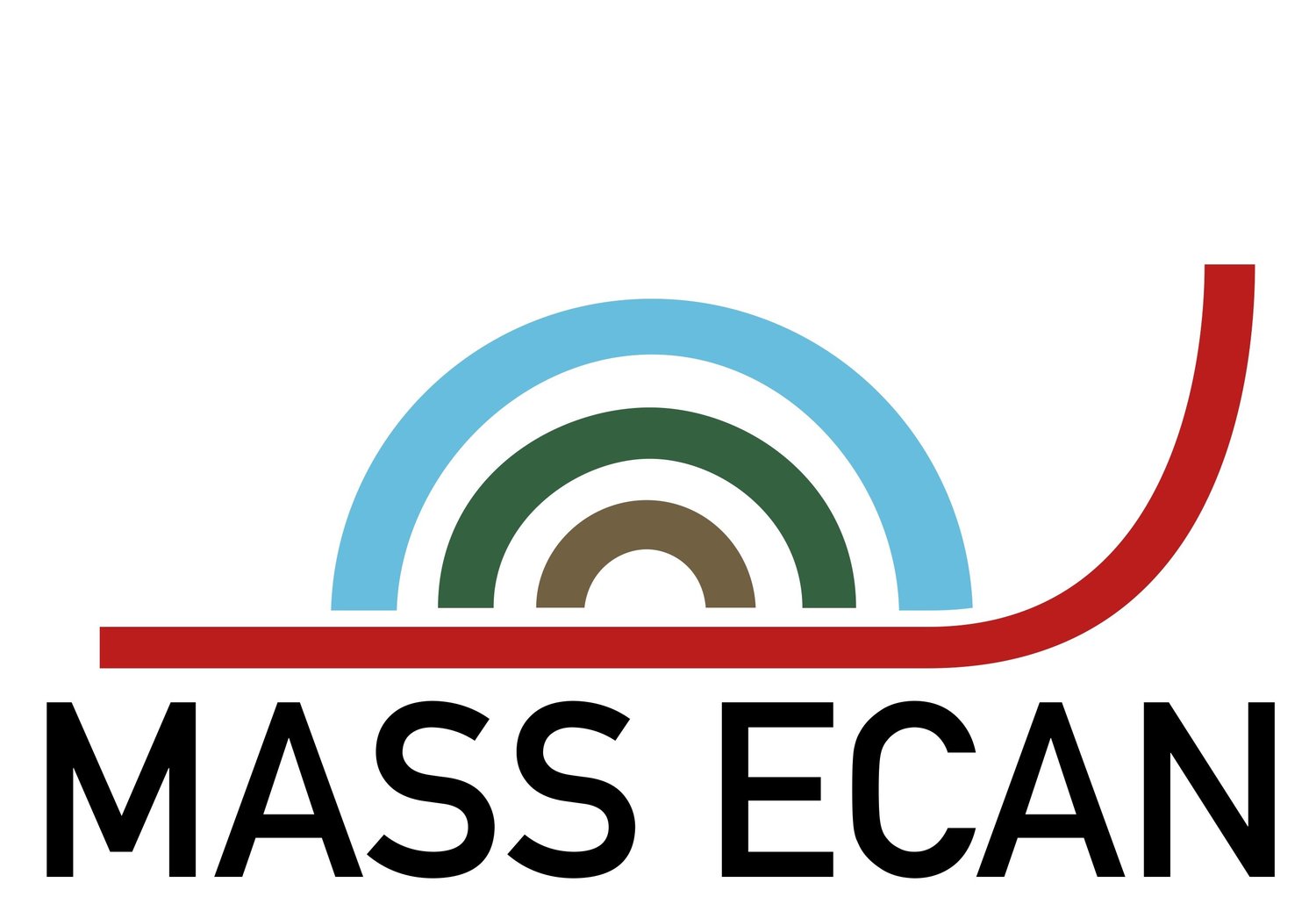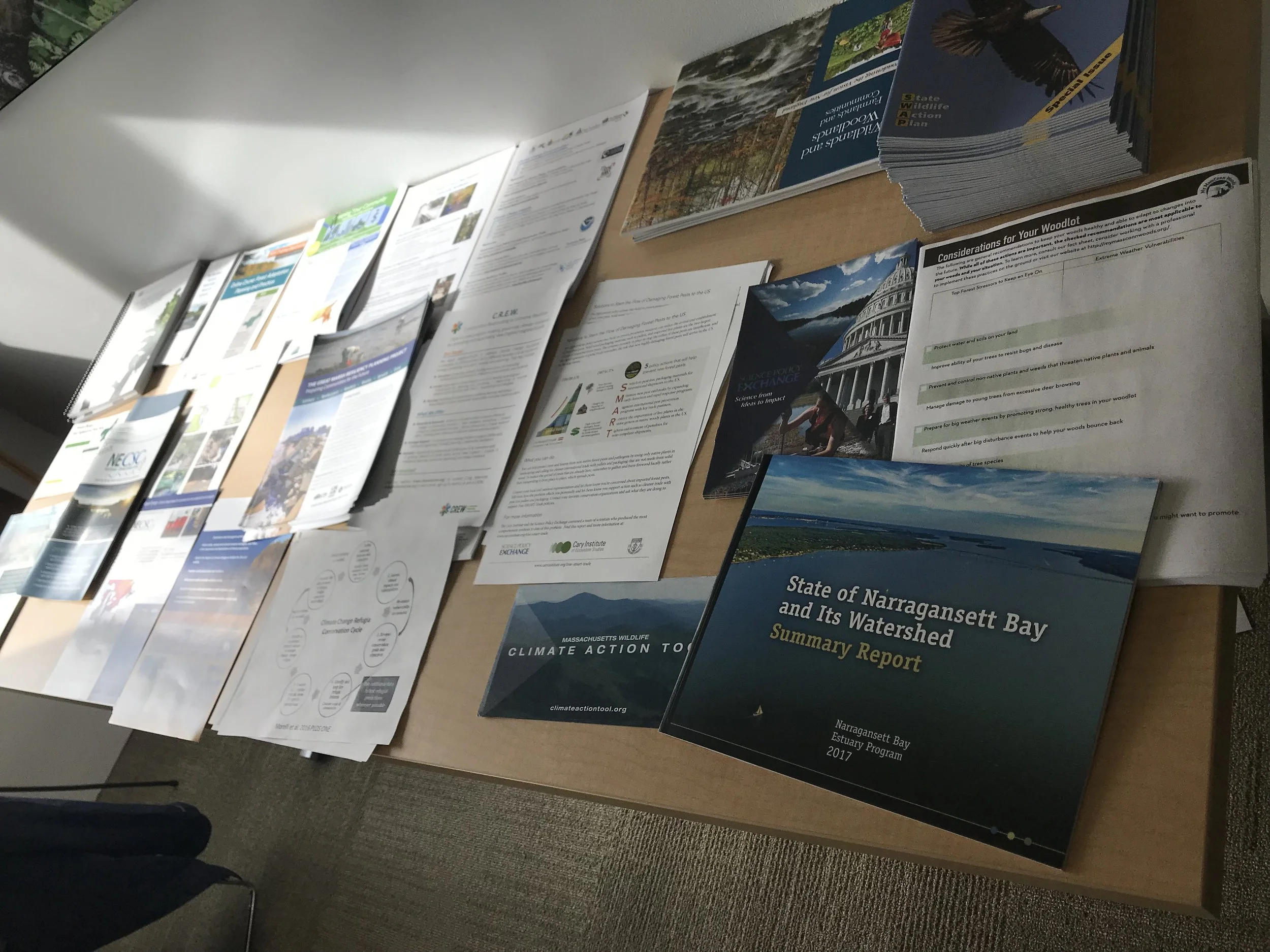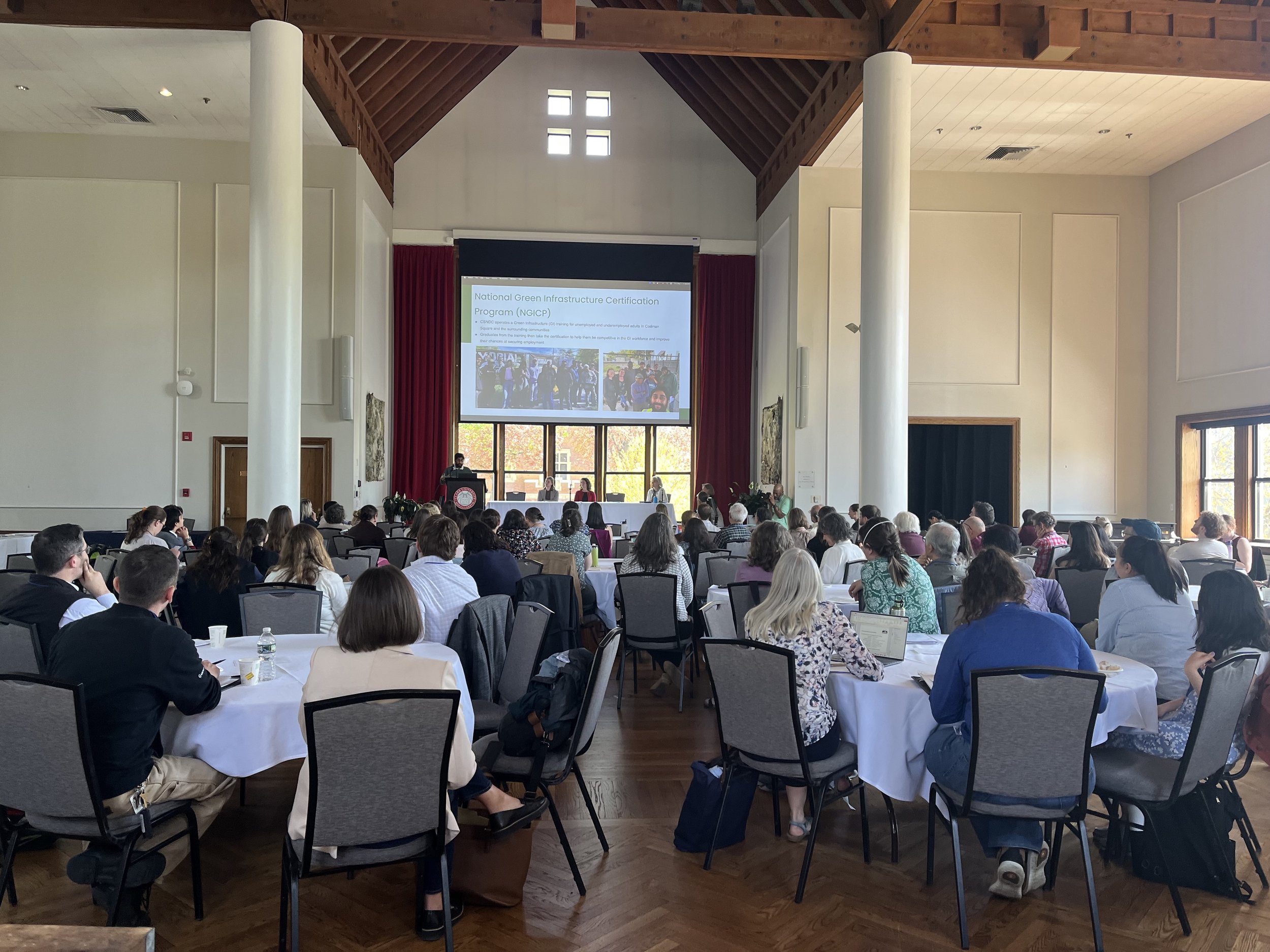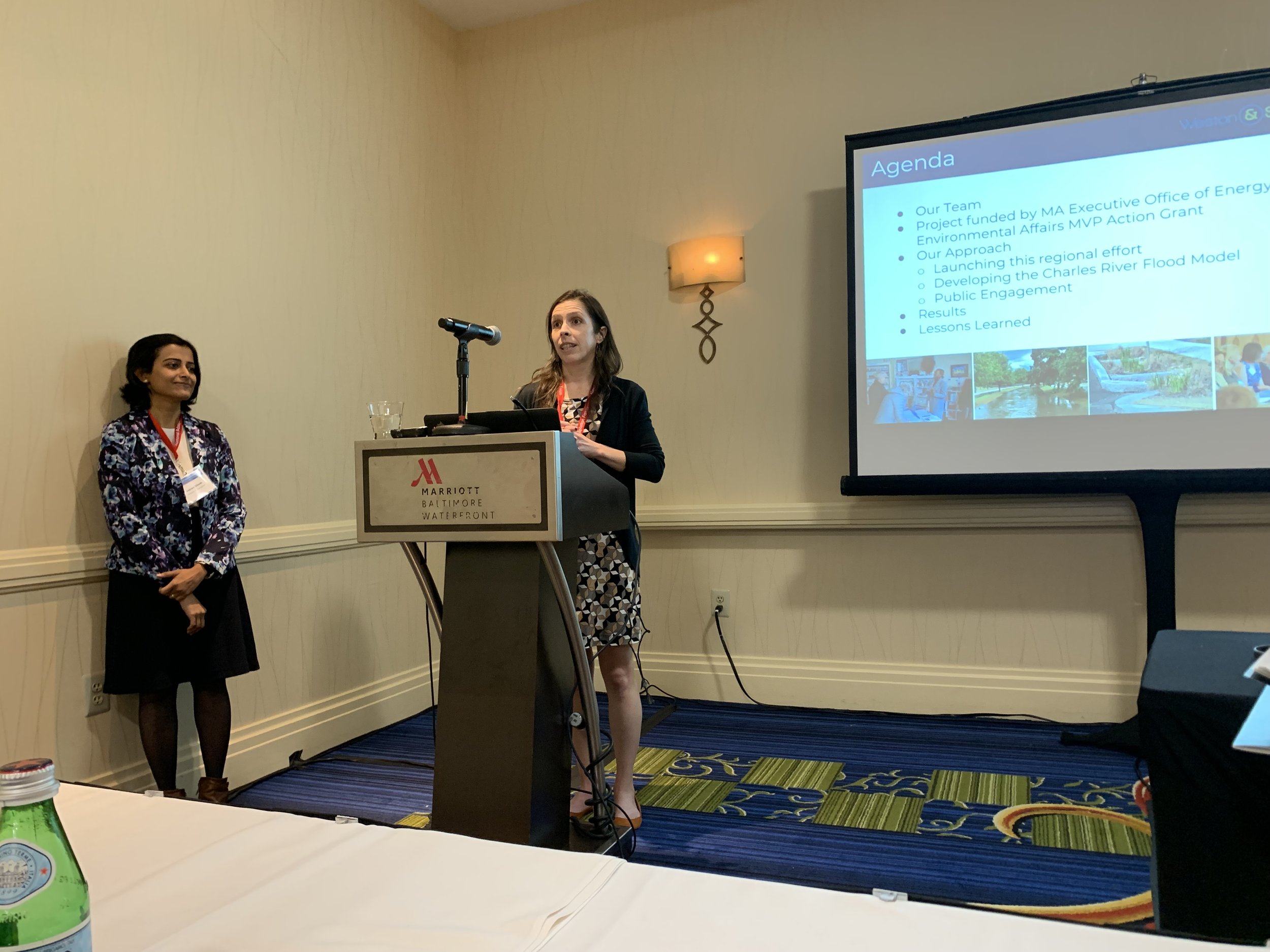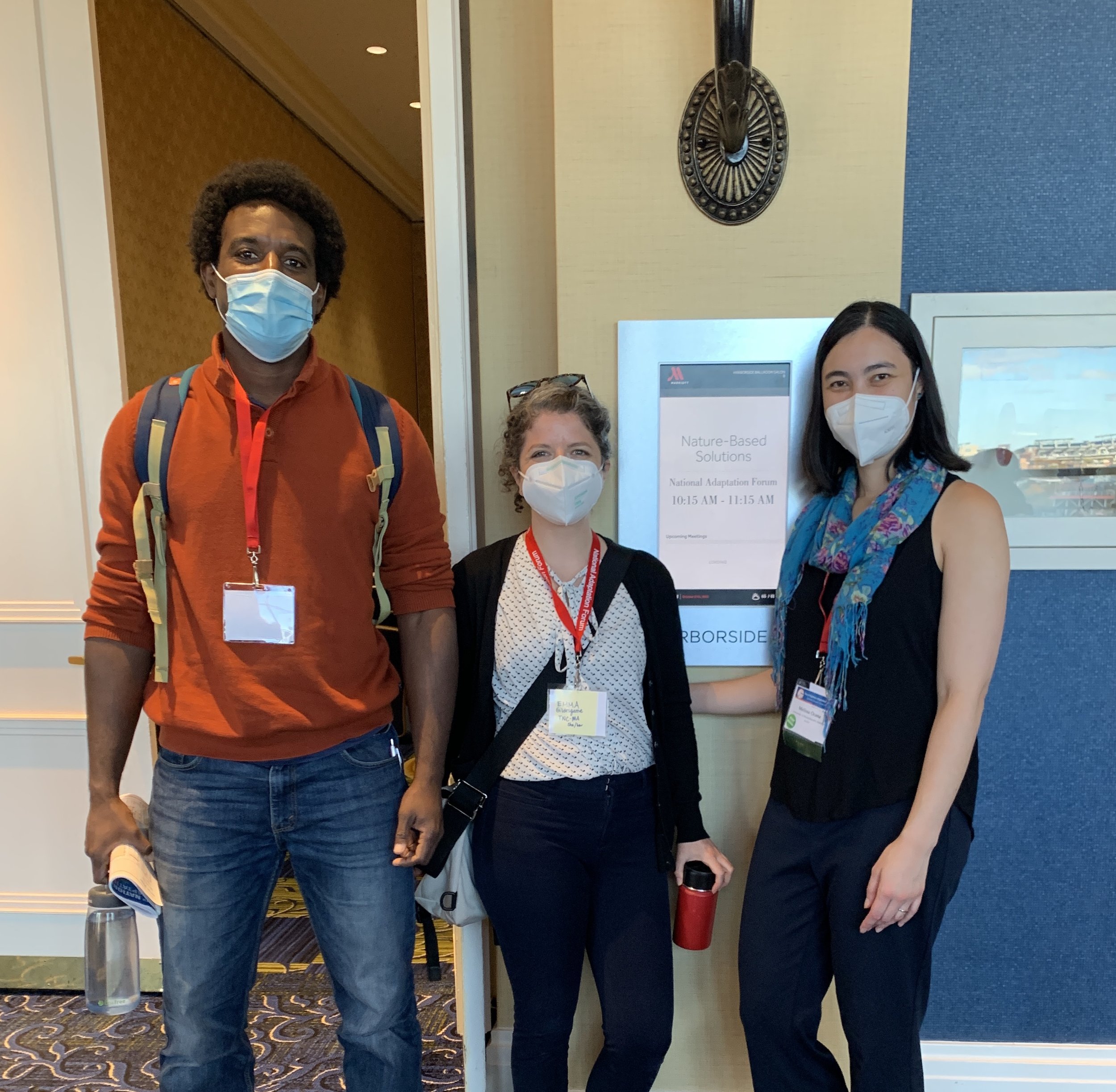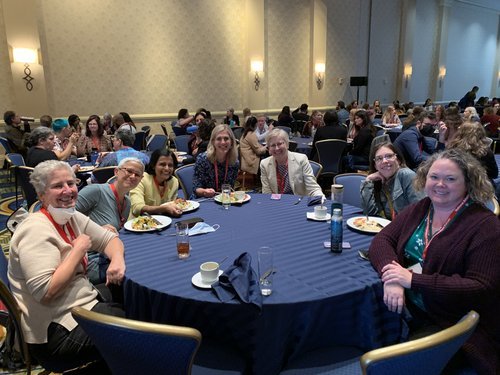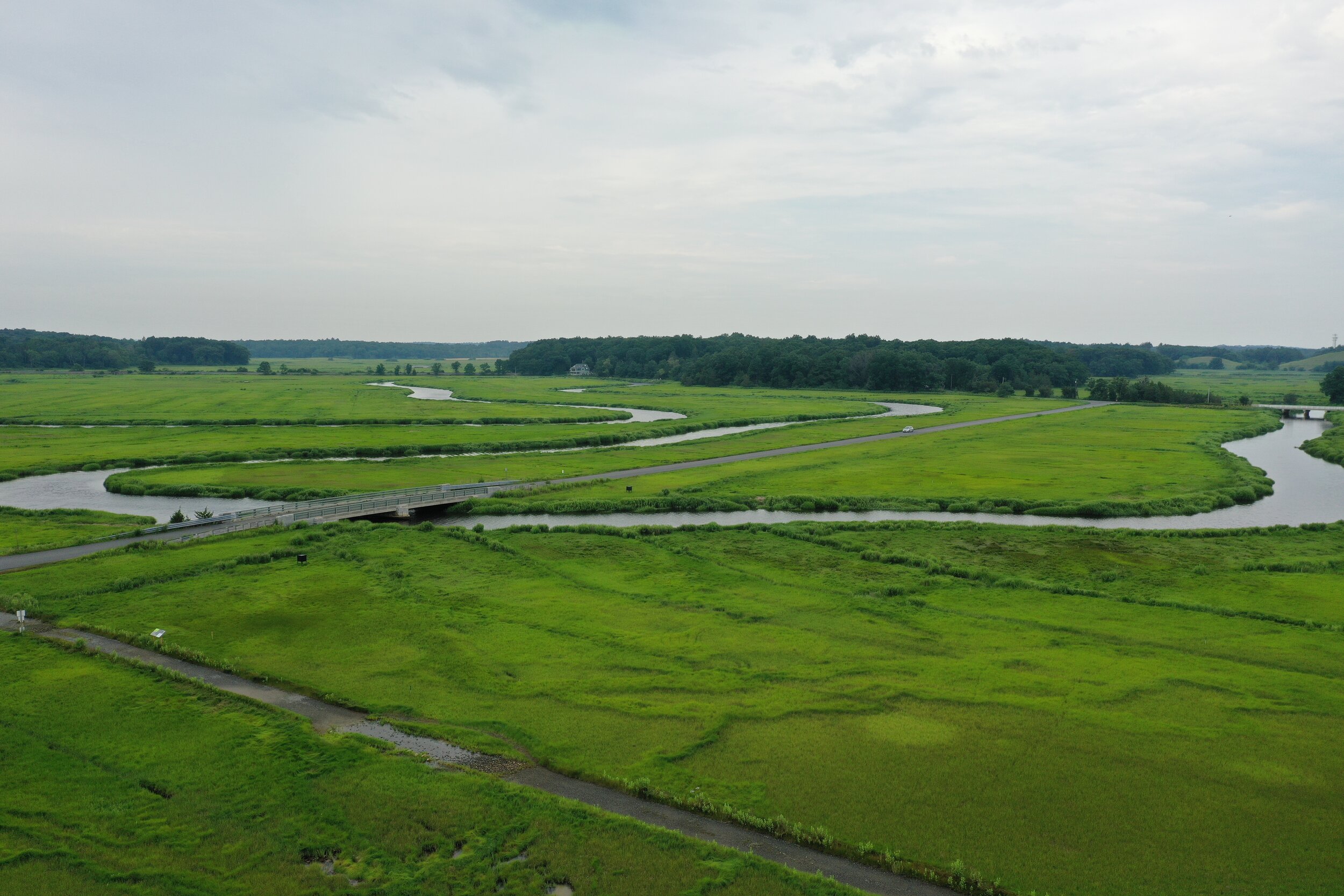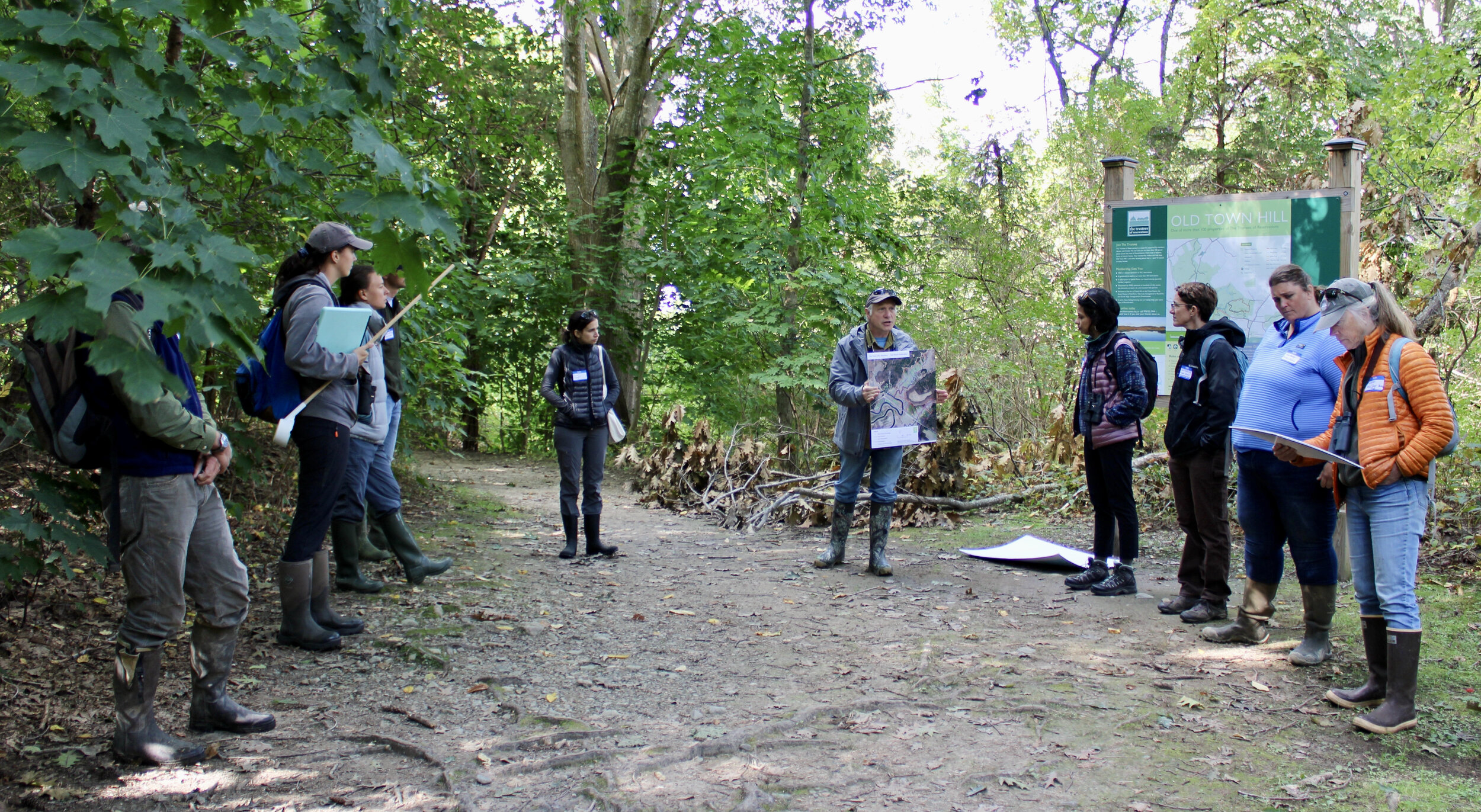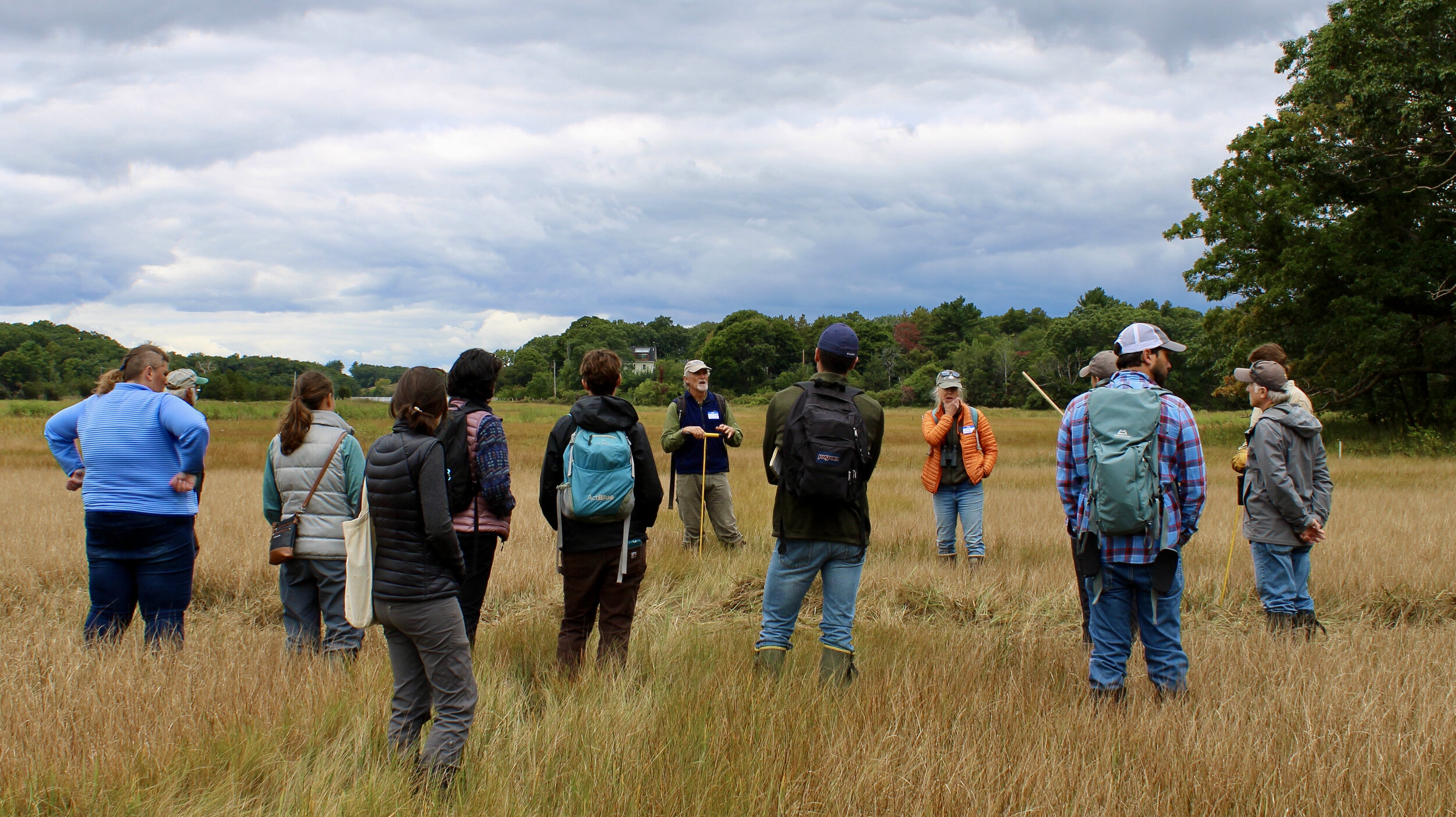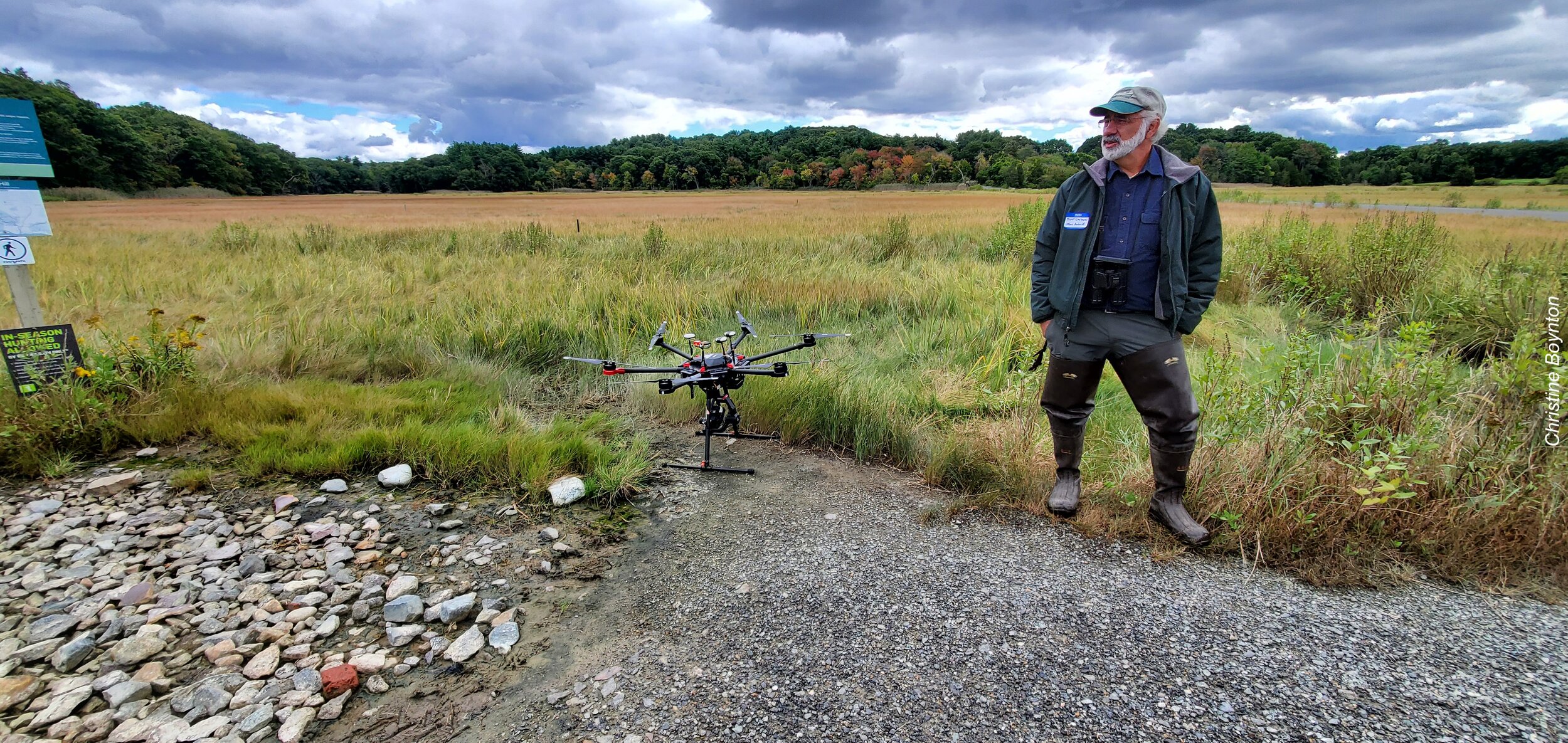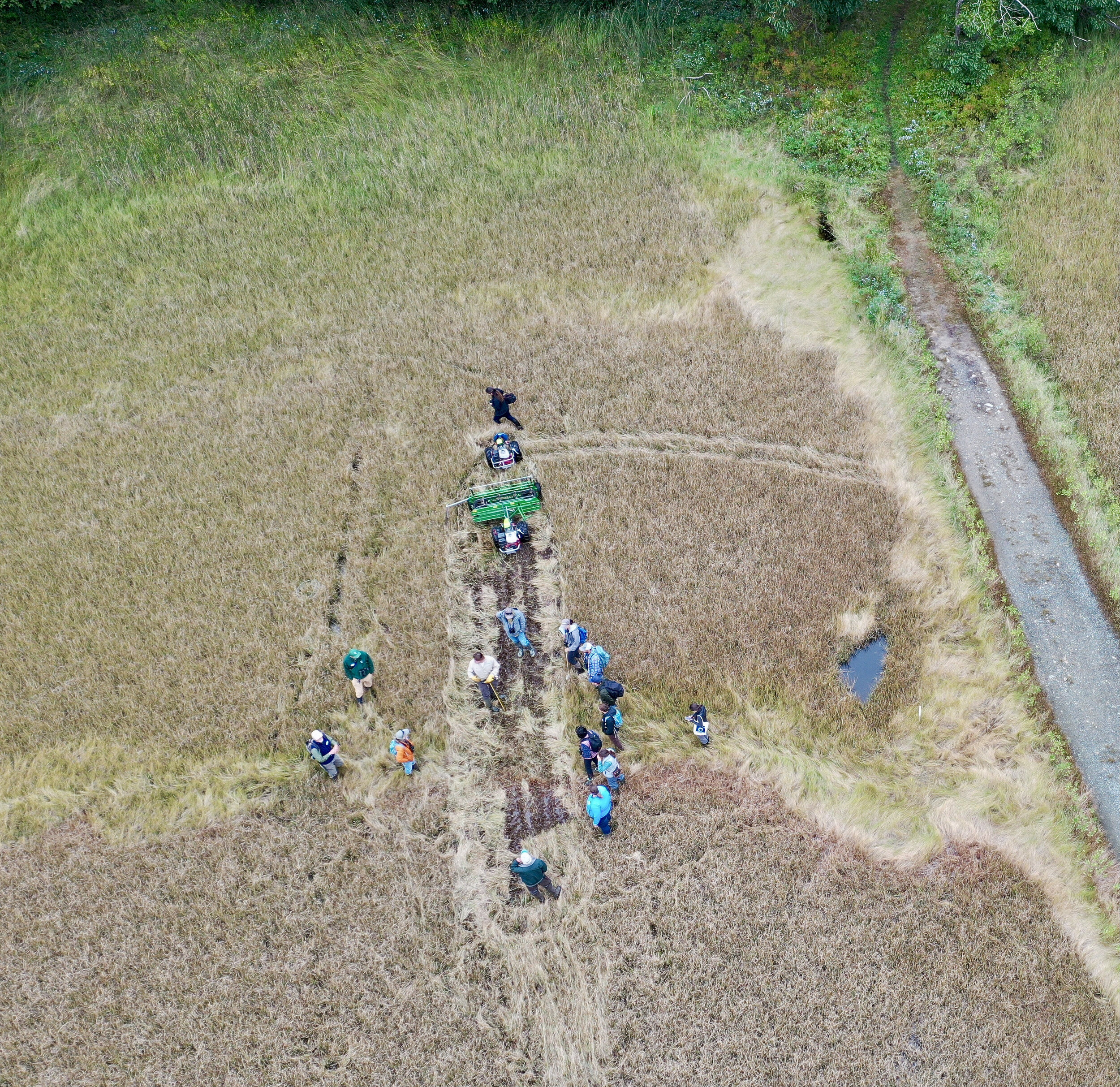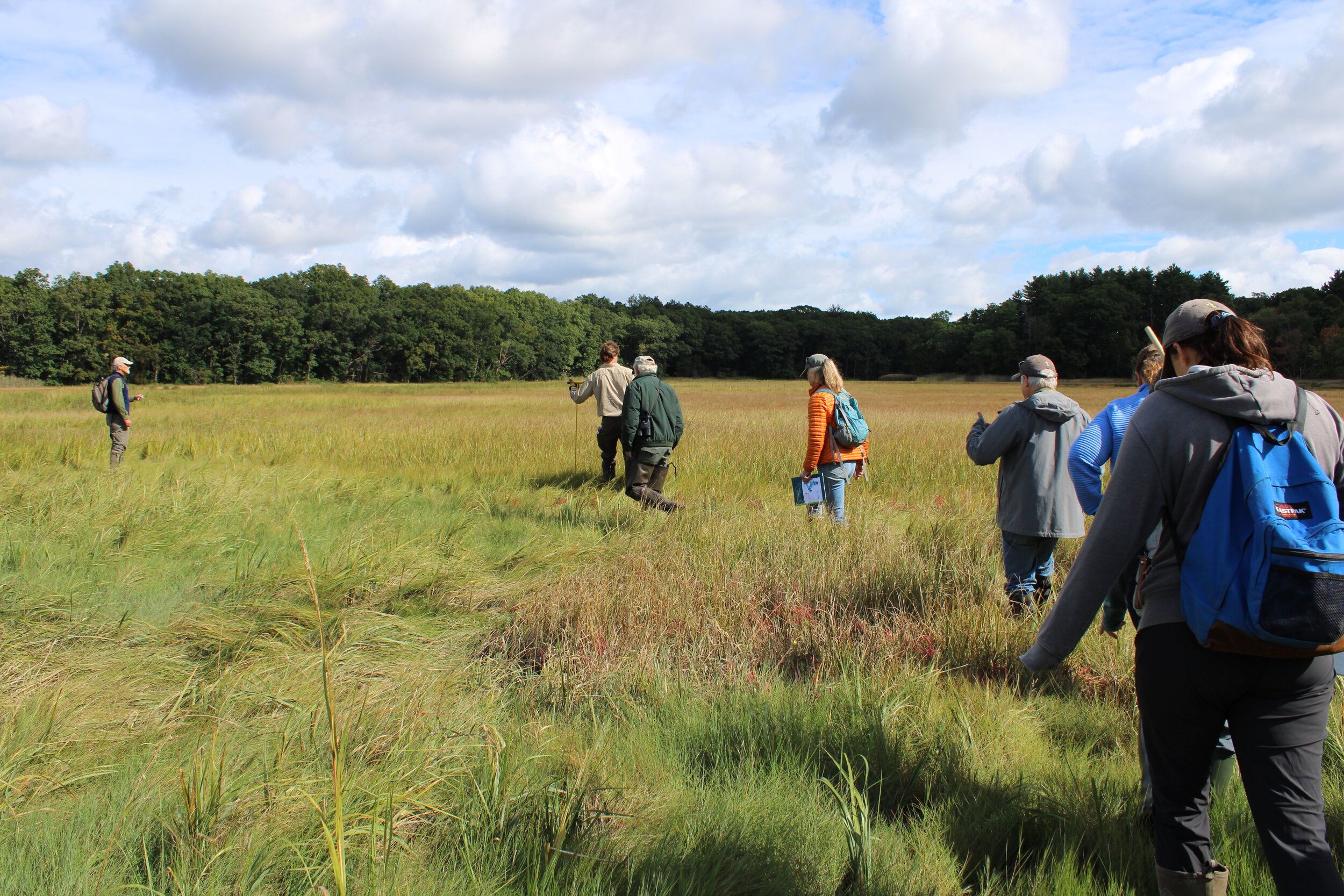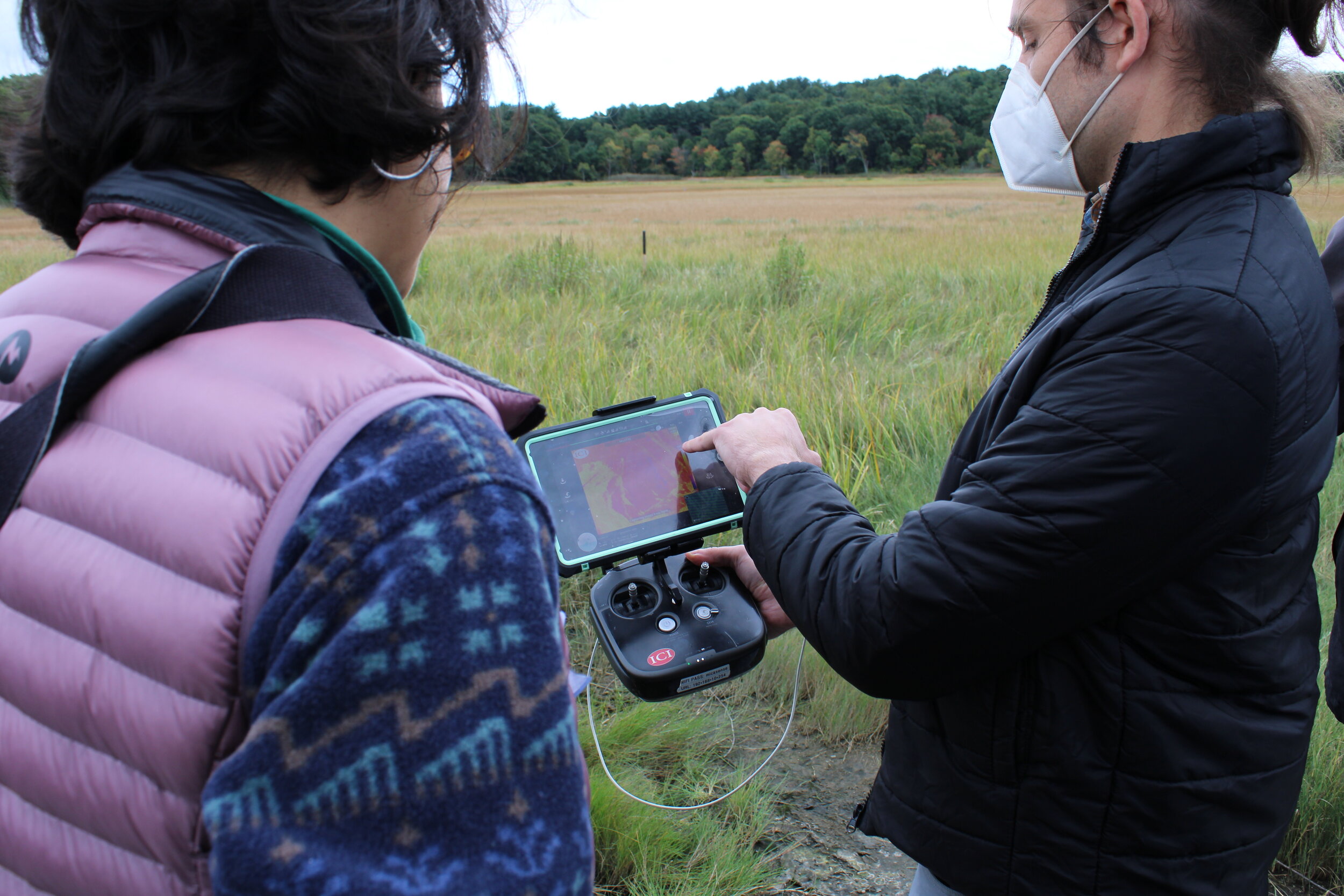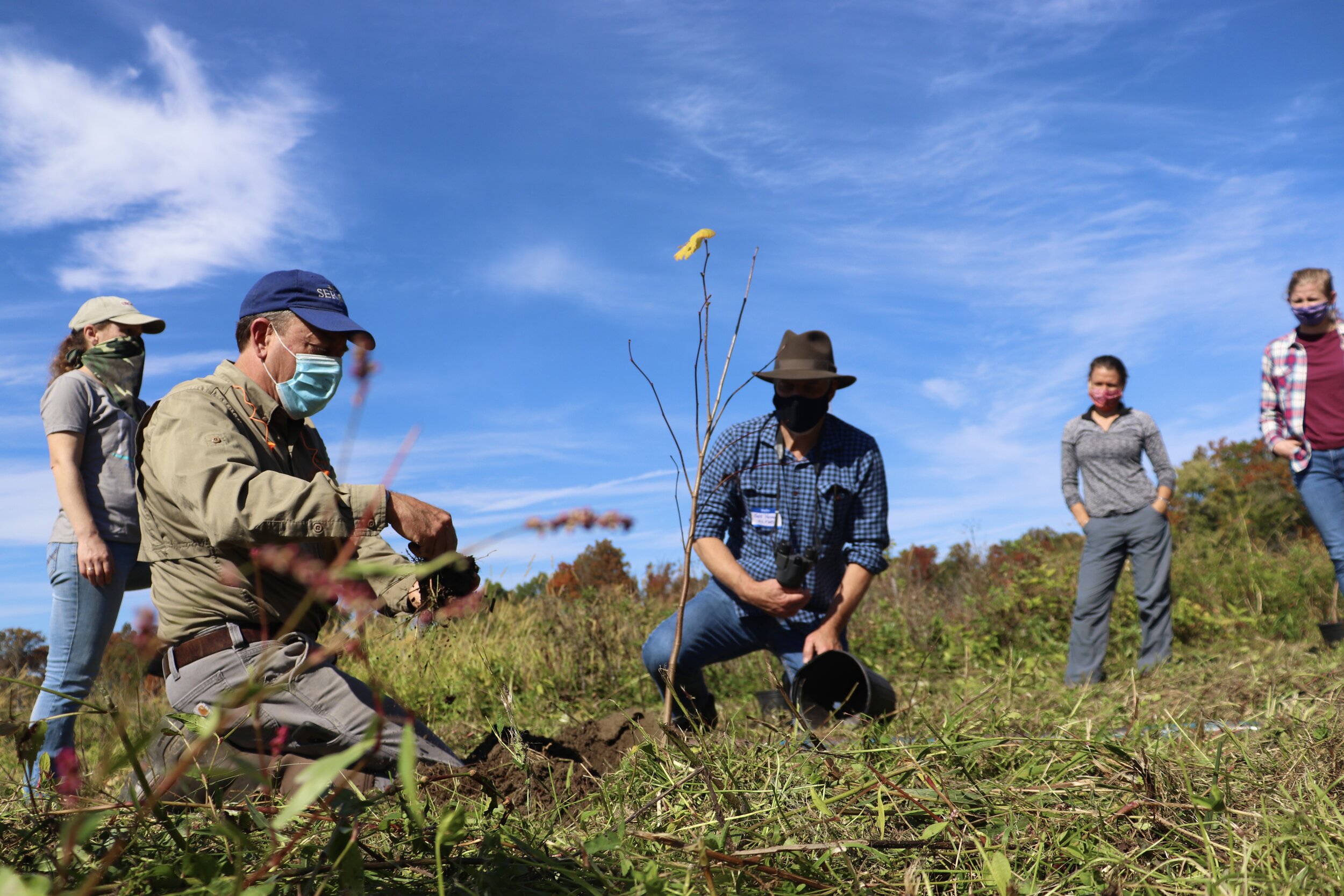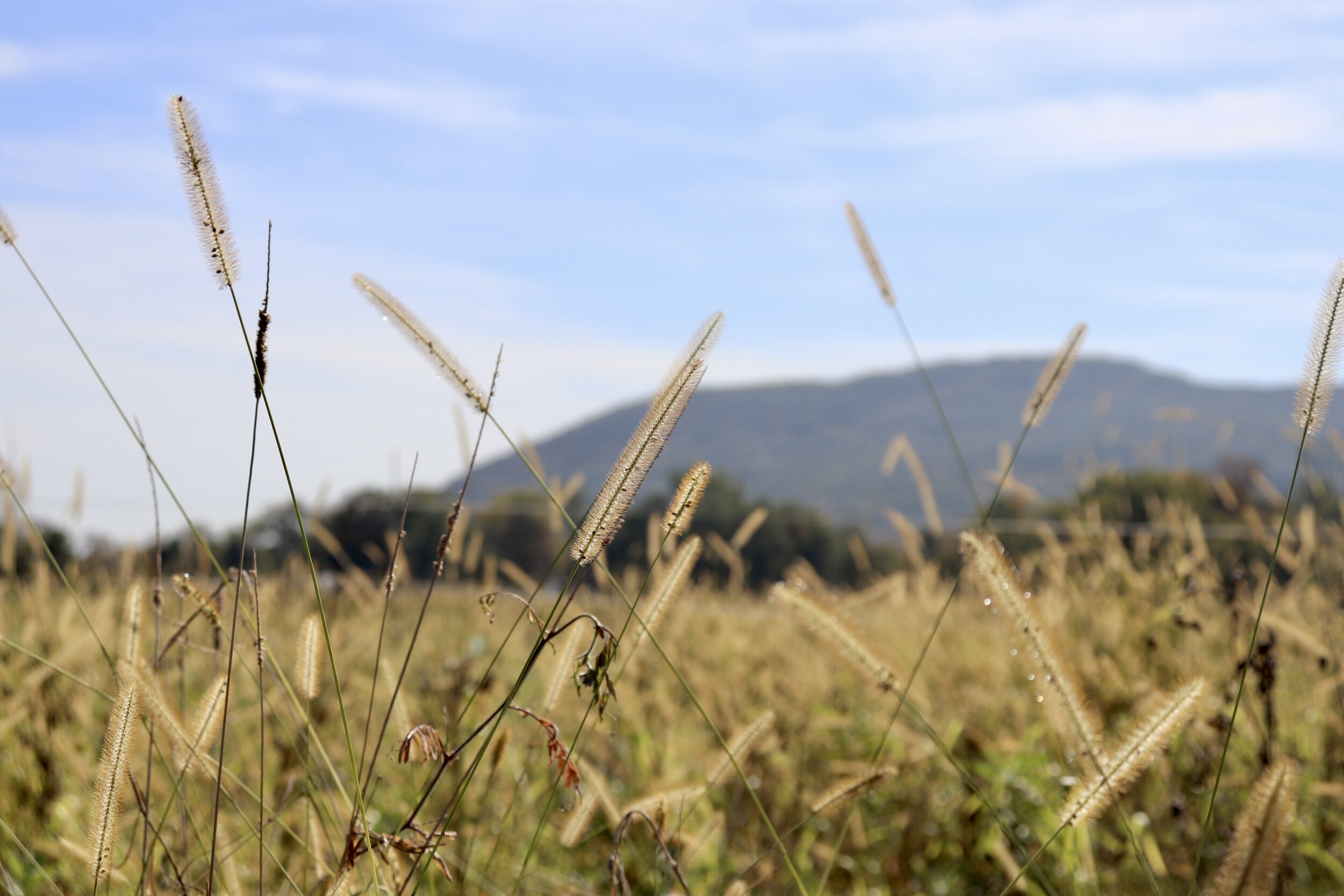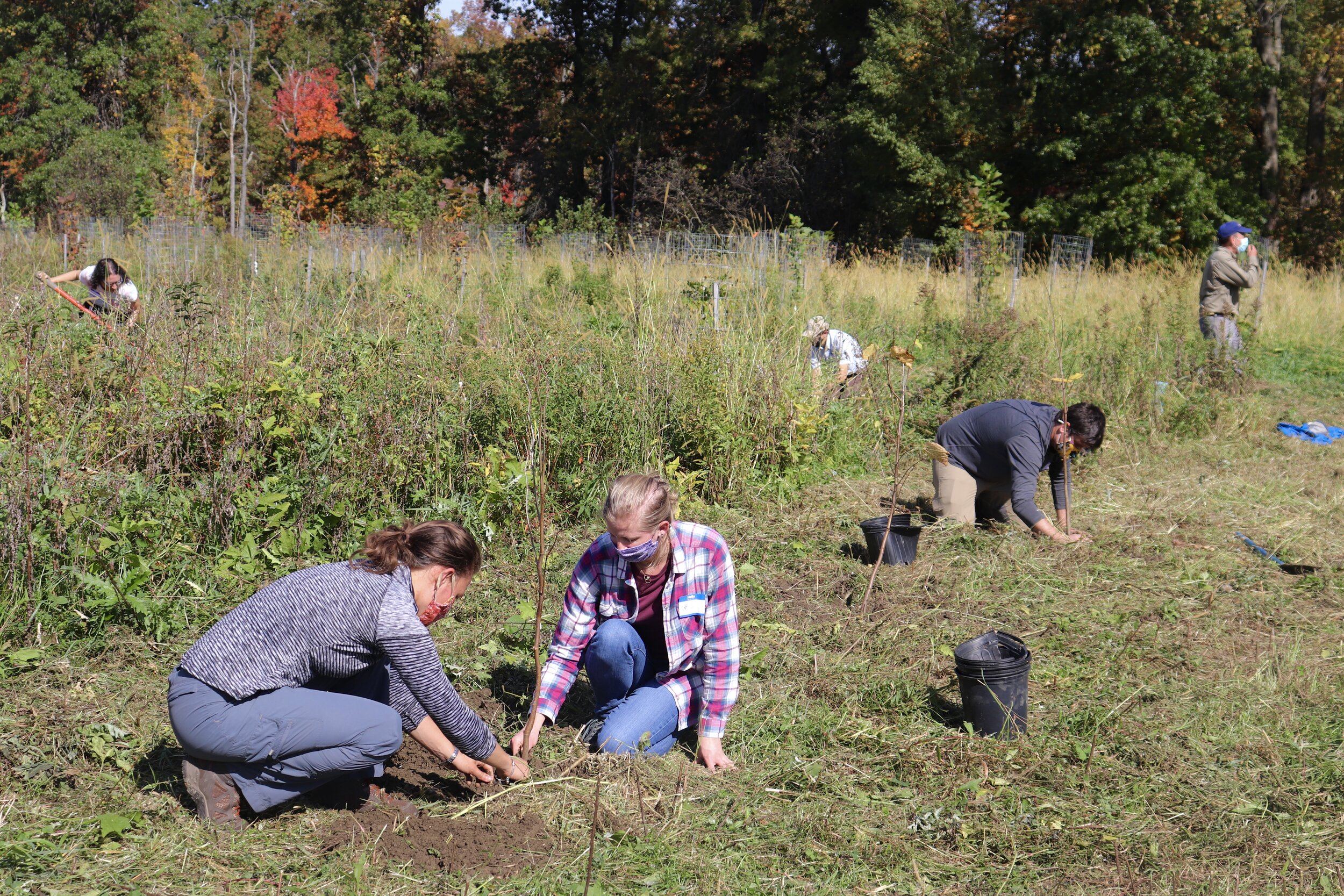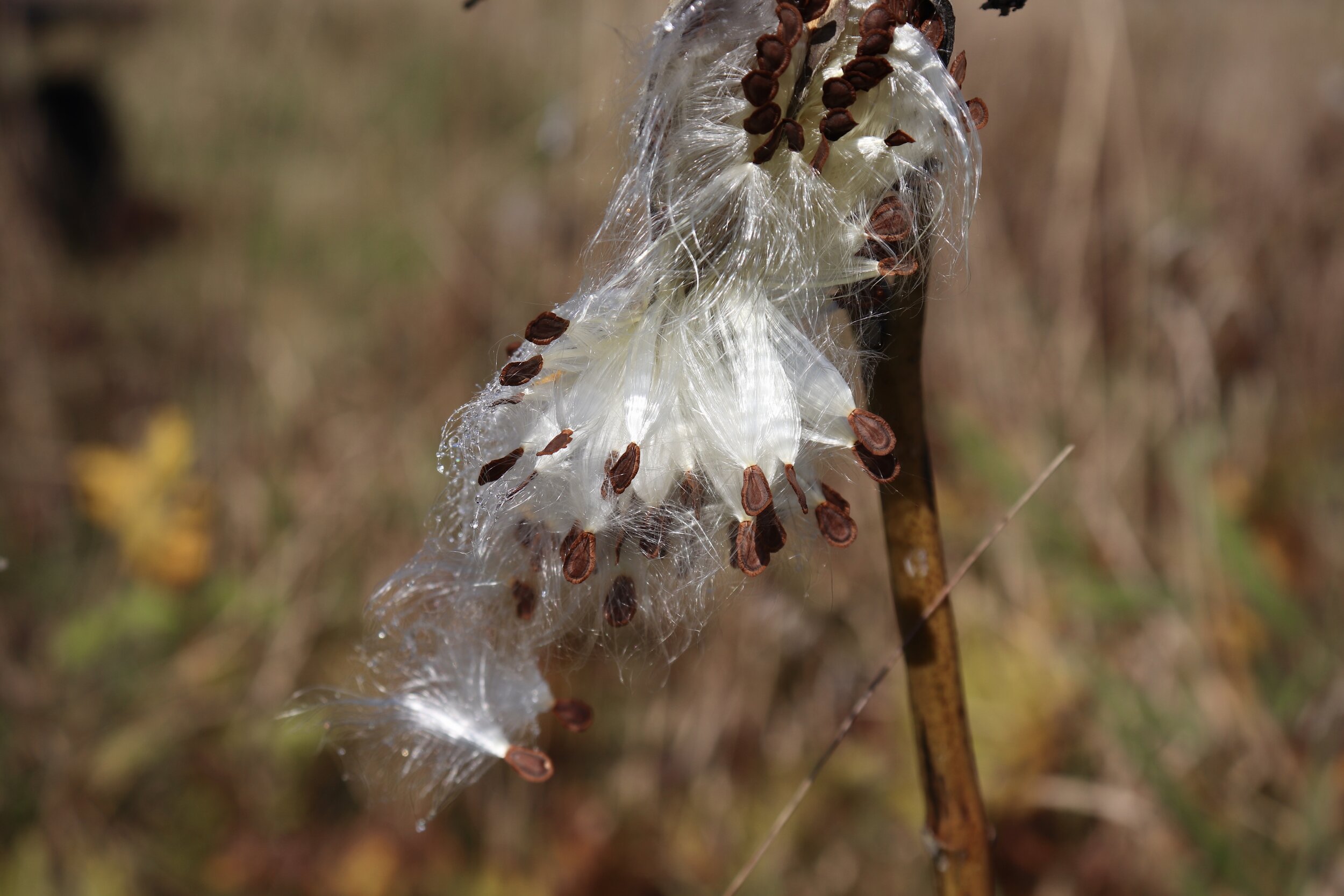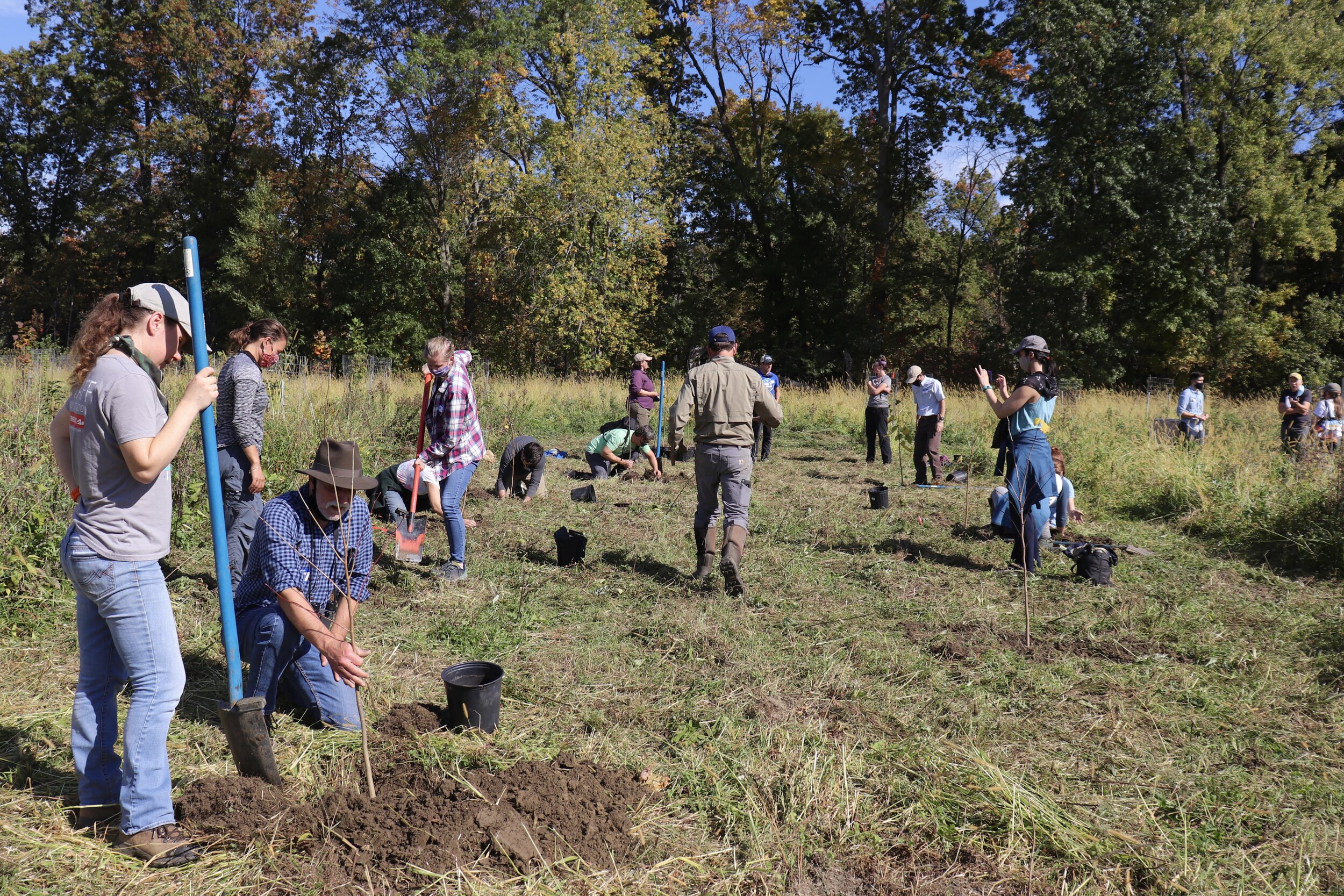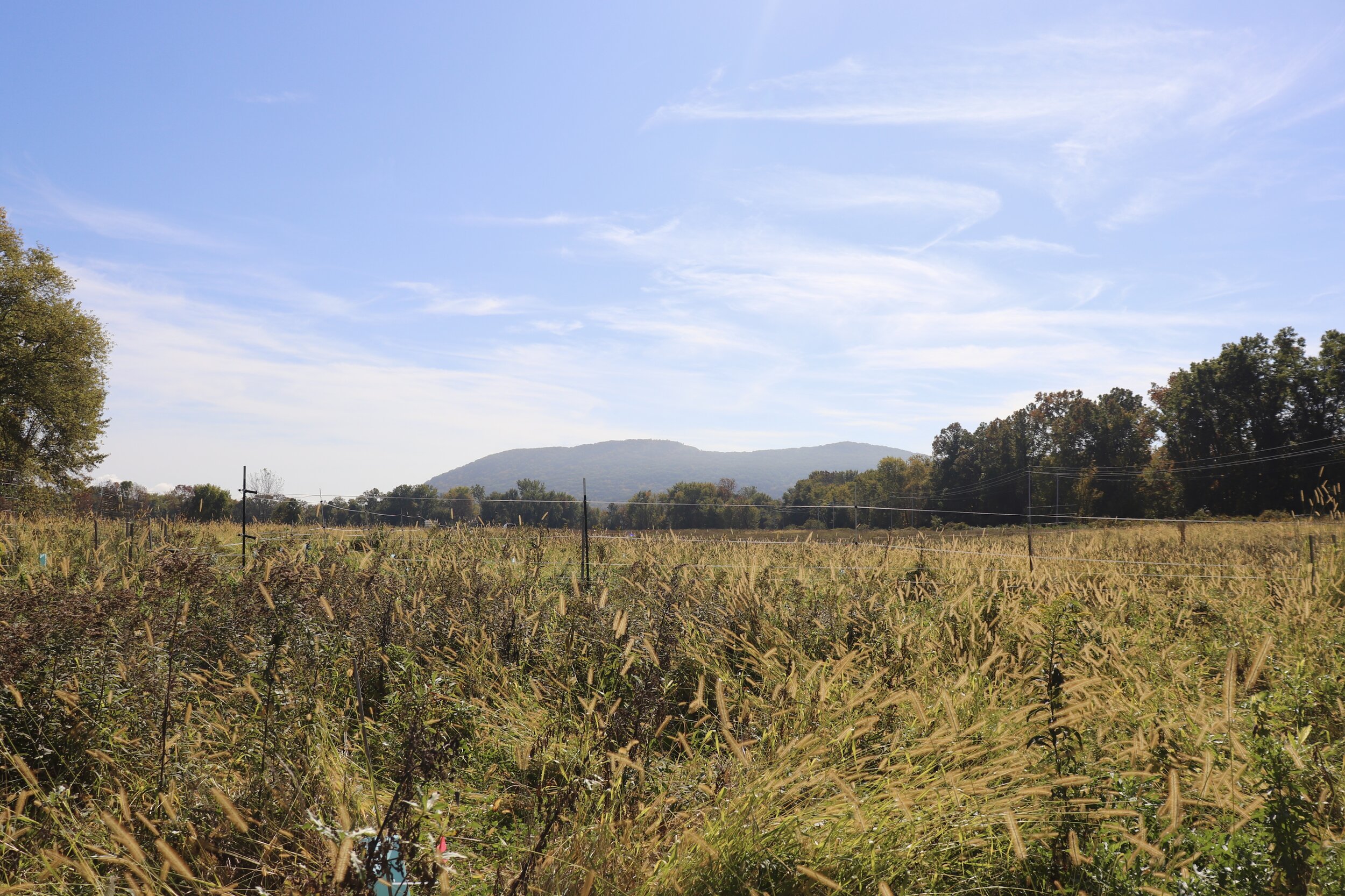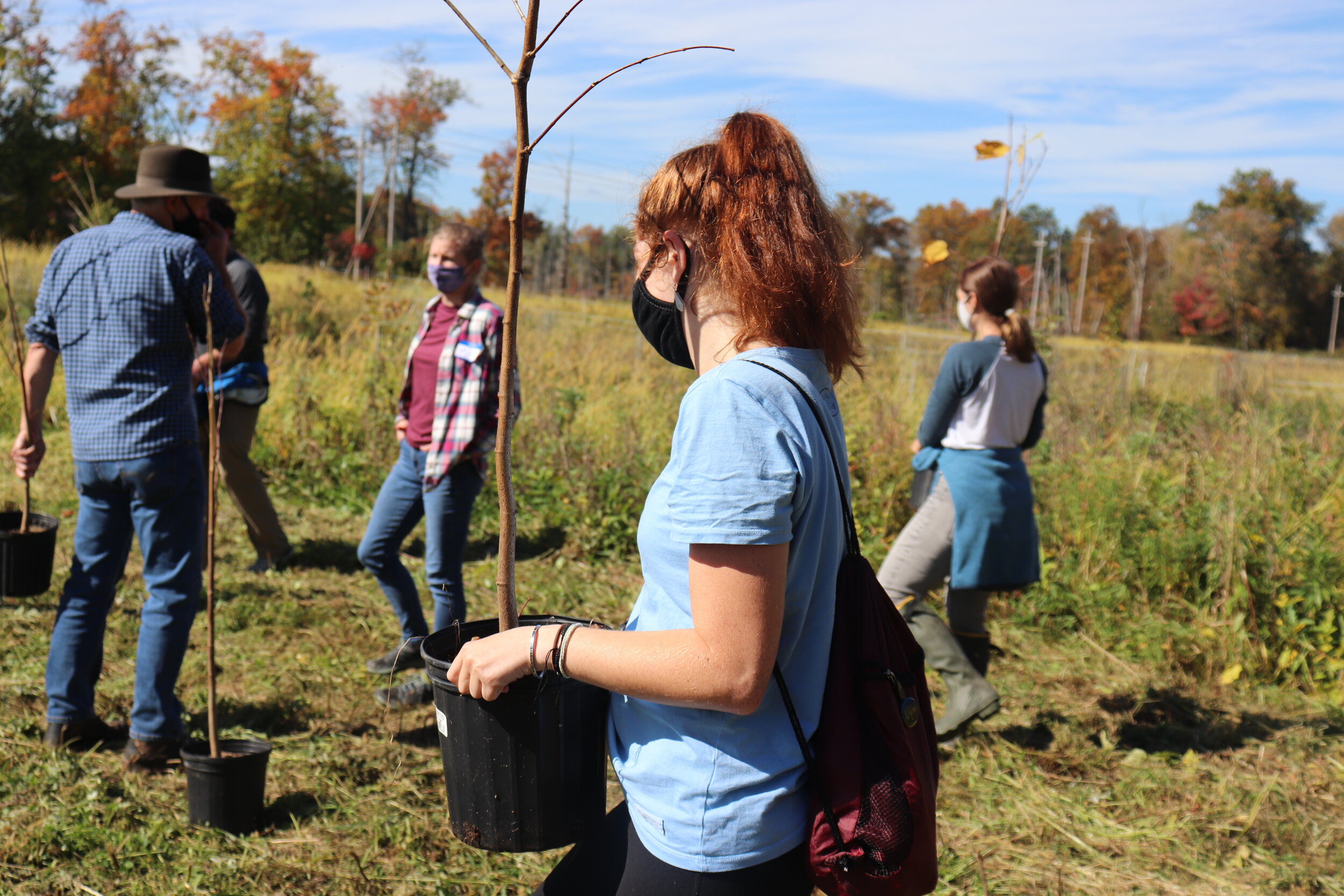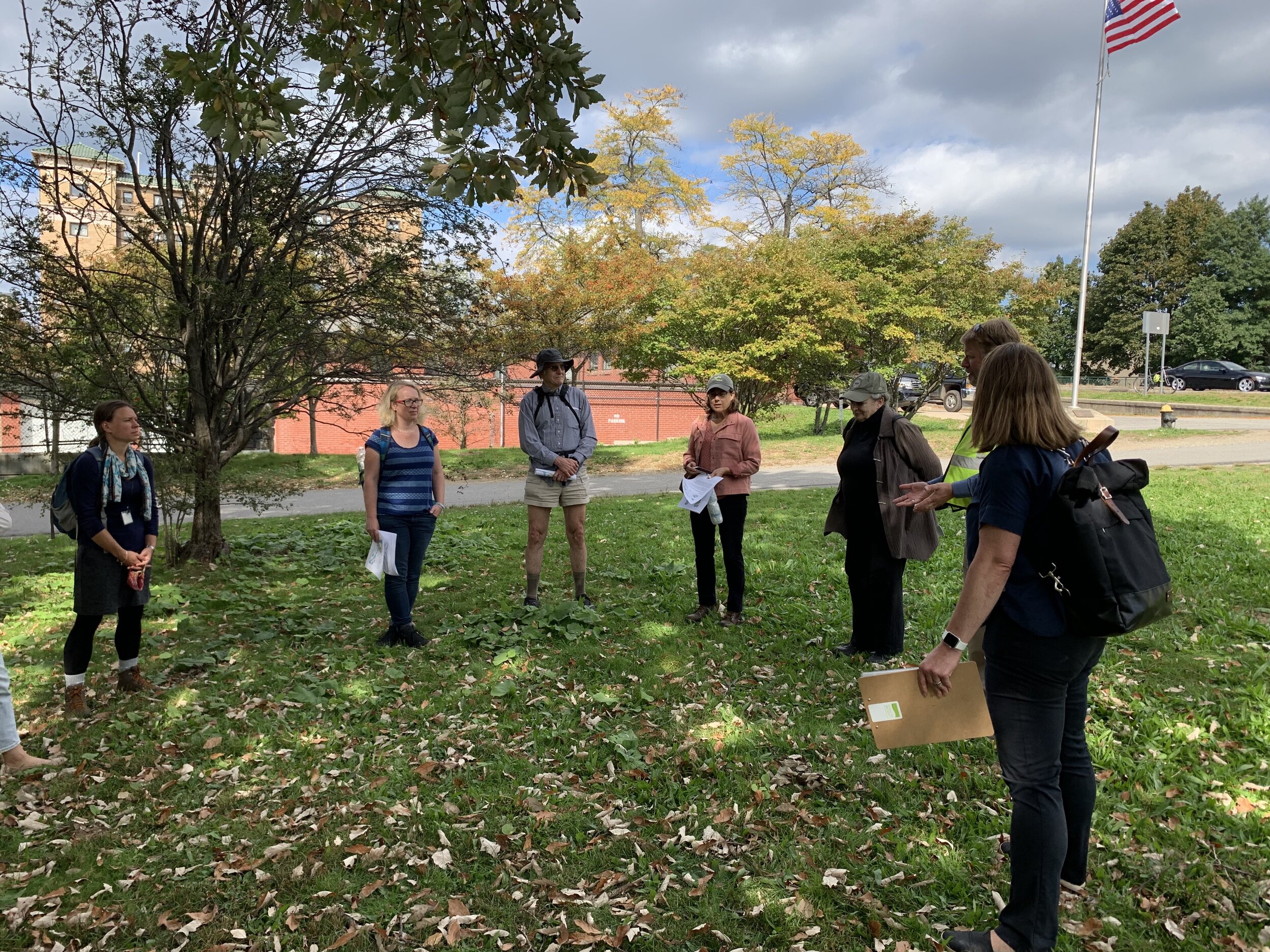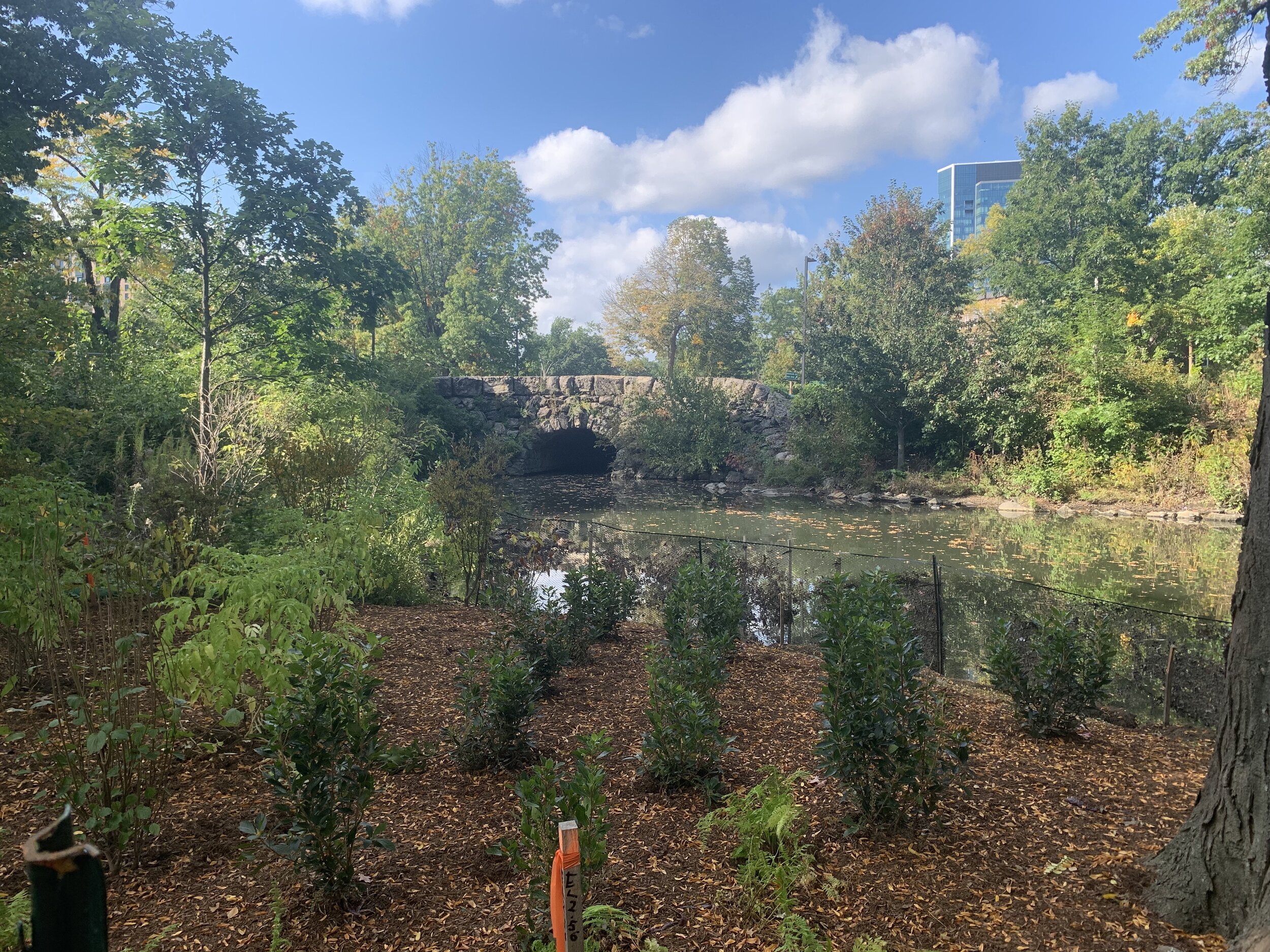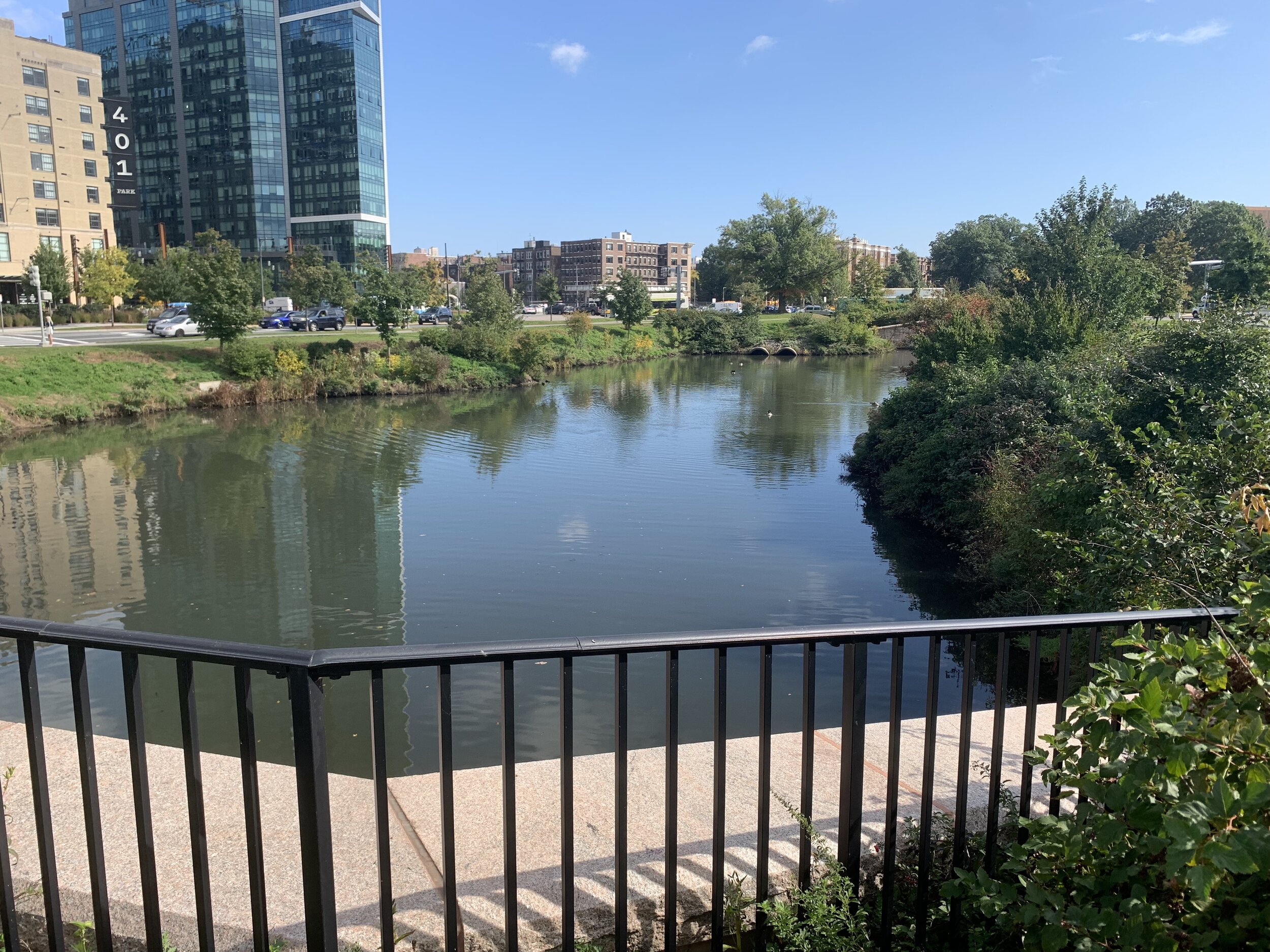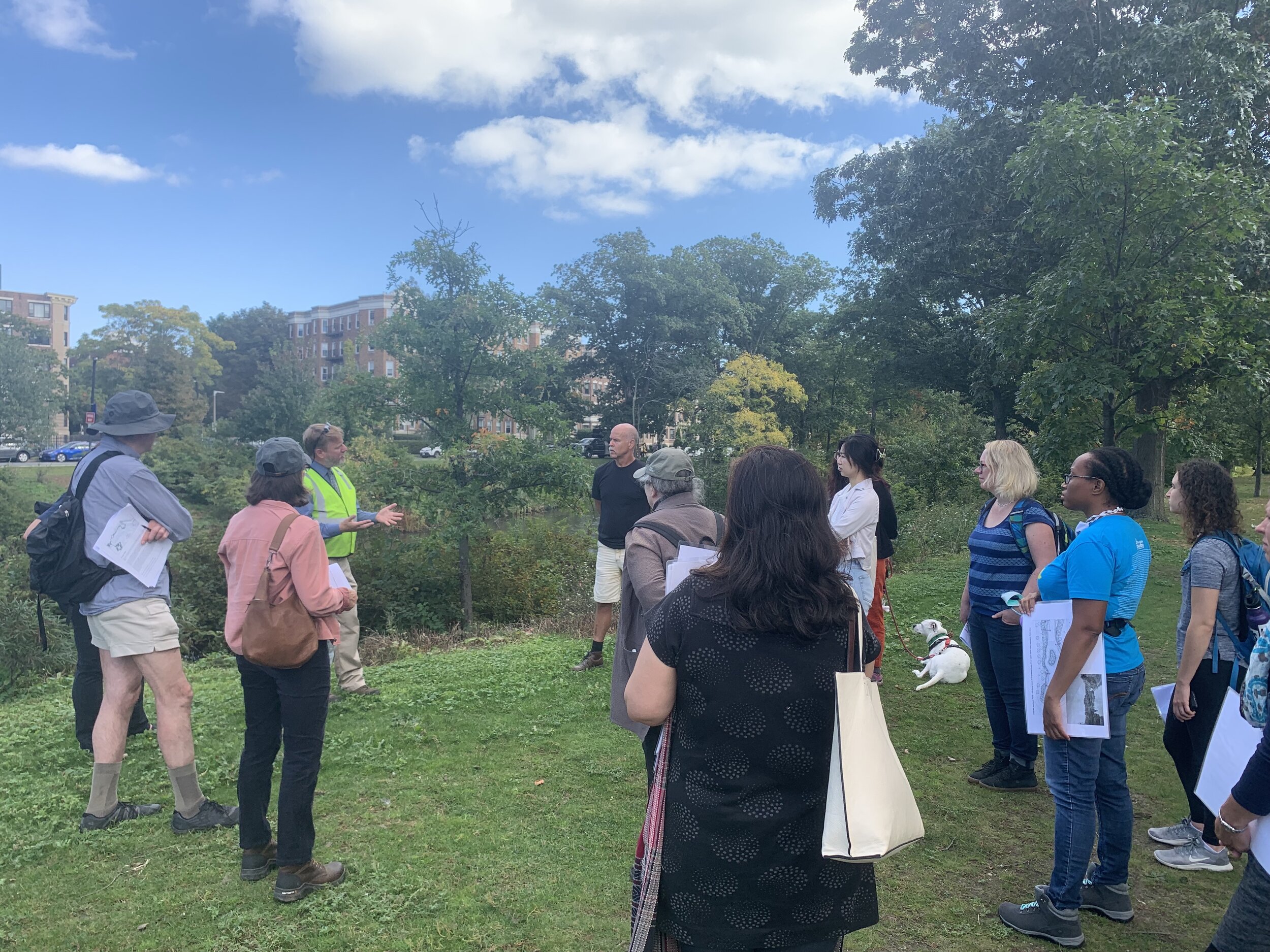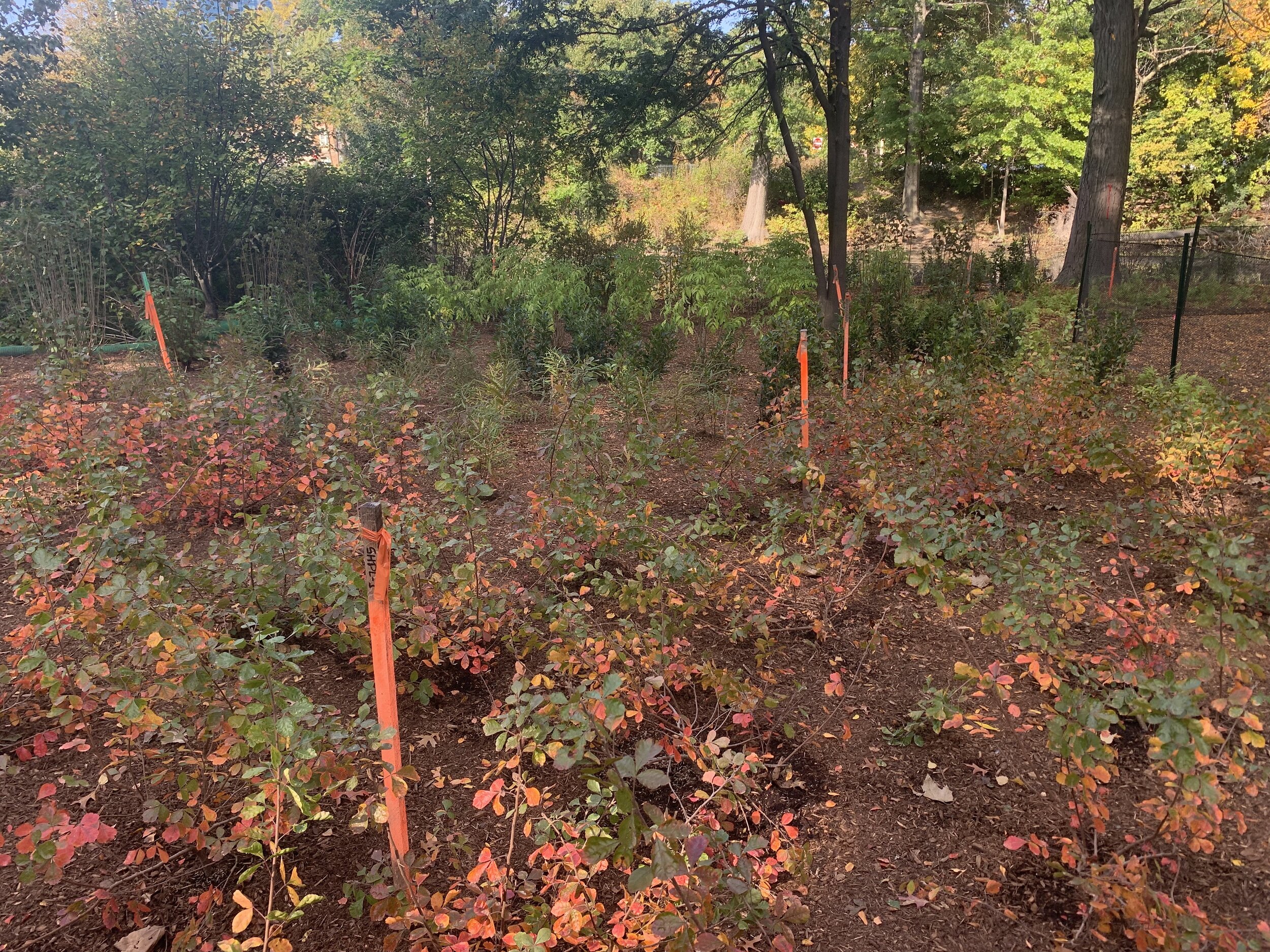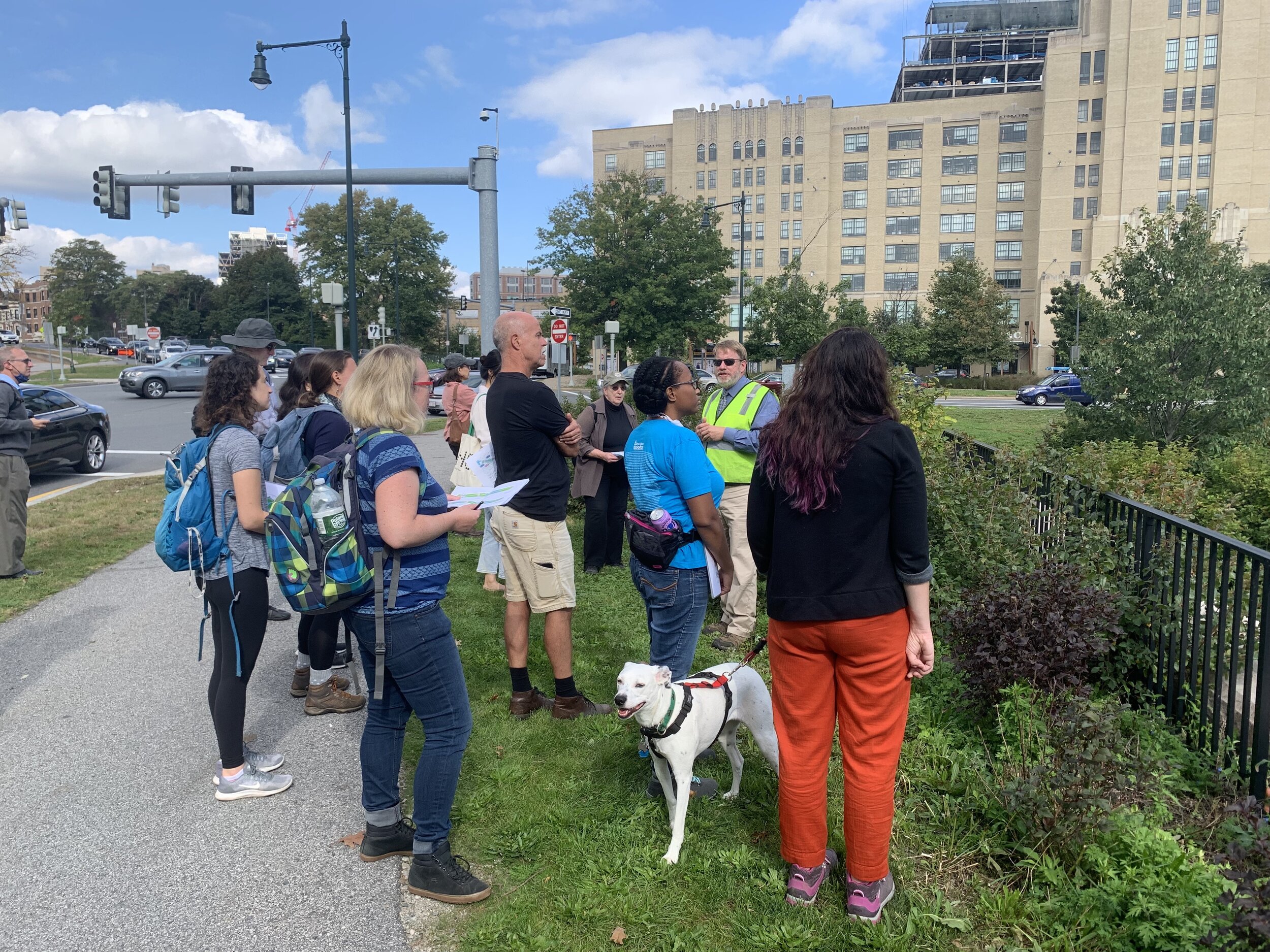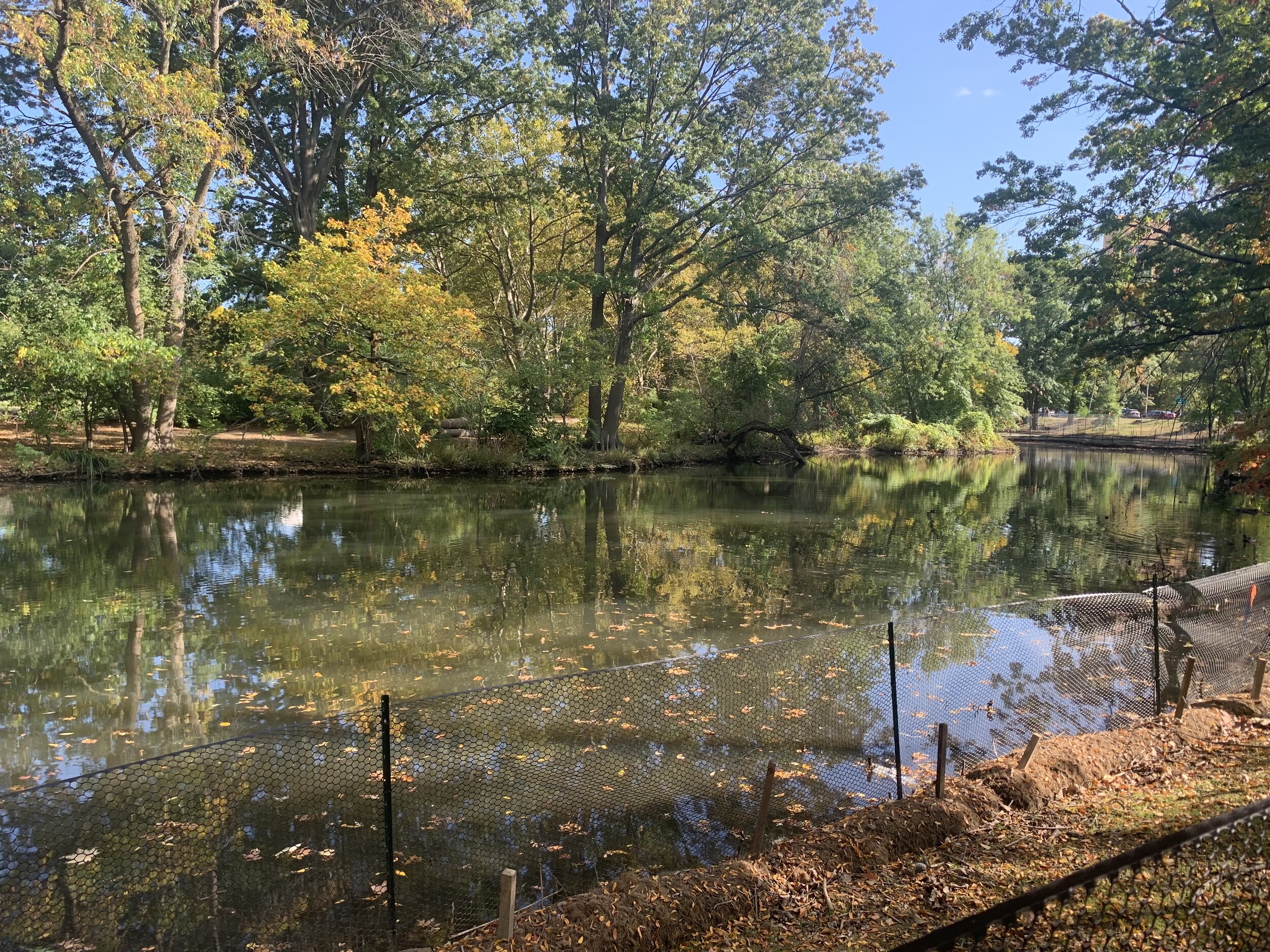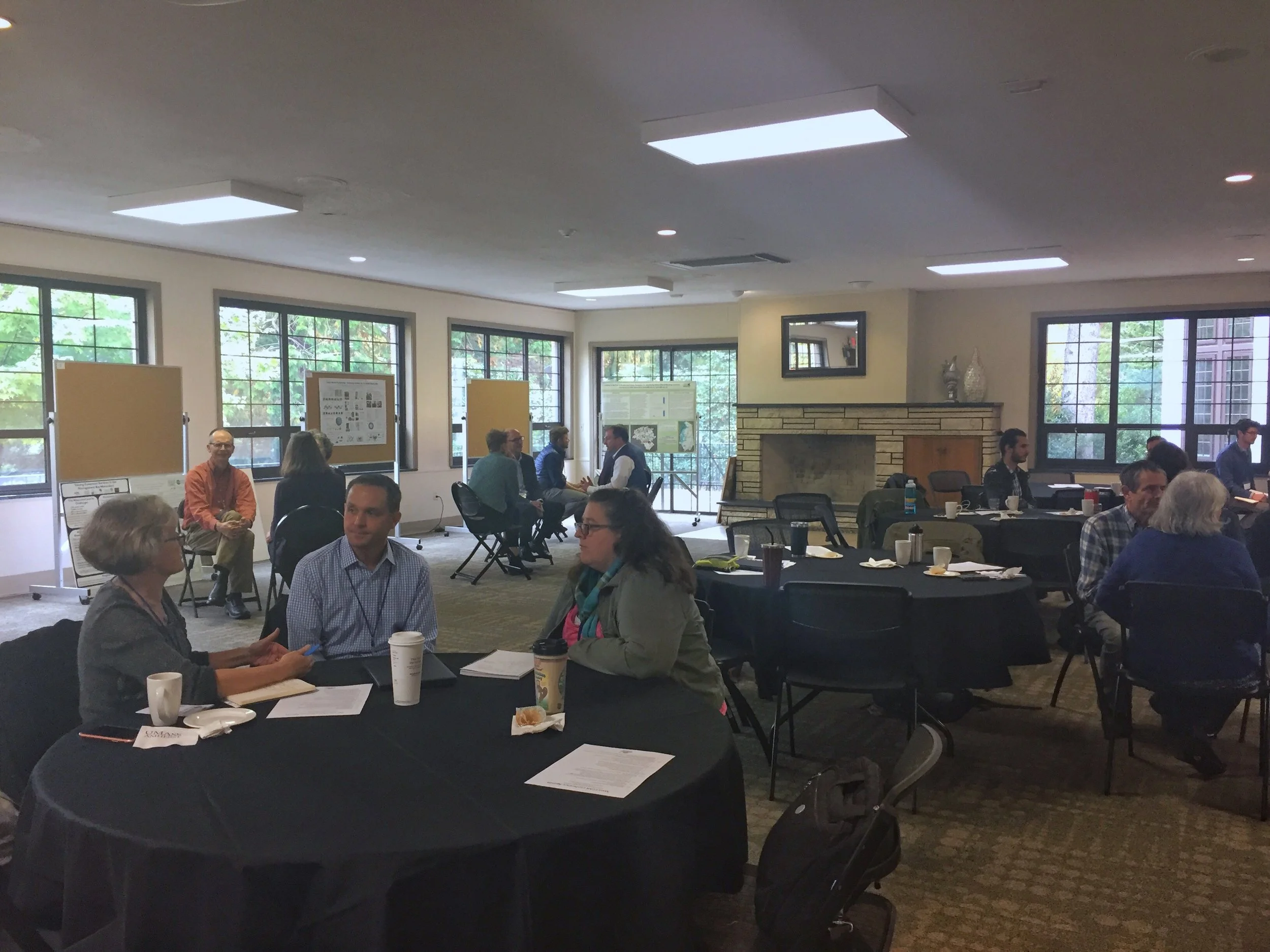2025 was a busy year for Mass ECAN! See below for everything we were able to accomplish together:
Reflections on our 5th Mass ECAN Conference
Thank you to everyone who attended and supported our 5th Mass ECAN Conference, with the theme of Mainstreaming Nature Based Solutions, on May 1st. It was wonderful to see about 120 of you at this event – there’s nothing quite like an in-person gathering!
Mass ECAN conferences aim to create space to learn from each other and connect as a community of practice. Colleagues from a variety of organizations attended, including non-profits, state agencies, municipalities, regional planning authorities, consulting firms, and universities.
We started by grounding ourselves in the theme of Mainstreaming (increasing the adoption of an approach or practice) and Nature Based Solutions (using nature to solve a problem, in this case, impacts of climate change). By the end, we had uncovered some takeaways about the state of mainstreaming NBS in Massachusetts:
Implementation of NBS for climate adaptation has taken off and grown widely in the last few years in our state and around the world.
There are many wonderful examples of work being done as Massachusetts is a leader that can hopefully inspire others.
There are a number of barriers that remain, including around around permitting and lack of understanding that restoration is included in NBS.
There are some areas ripe and ready for more mainstreaming, including equitable community engagement and relationship-building, and around specific adaptation actions, such as implementing pocket forests.
There are some areas that need more nuanced exploration and education to be implemented effectively and equitably, such as how to avoid green gentrification and how to effectively employ an NBS workforce.
Thanks to the NBS Work Group for helping pull together takeaways!
See here for the detailed agenda with links to presentations and bios from our incredible speakers.
In addition to our mixing and mingling, we heard stories from 31 amazing speakers during our sessions:
Opening Remarks: Mia Mansfield, the Assistant Secretary for Resilience at EOEEA, shared the state’s commitment to climate resilience and updates about specific initiatives, including MVP 2.0 and the new Office of Climate Science.
Misconceptions & Municipal Success Stories: Practitioners shared examples and stories to help address common misconceptions regarding barriers to mainstreaming NBS.
Building Community Relationships: Regional planning agencies and non-profit organizations demonstrated ways to center communities in NBS planning, implementation, and workforce development.
Climate Cafe: Participants shared their personal experiences and feelings about how the climate crisis has impacted them in a safe, professionally facilitated space.
Permitting Perspectives from Practitioners: Speakers shared their diverse perspectives on streamlining existing permitting solutions and creating pathways for permitting innovative NBS.
Coastal & Riparian NBS: Mass ECAN Work Groups and partners provided updates on their work along rivers and the coast.
Resilient Forests & Landscapes: Mass ECAN Work Groups and Ambassador Awardees discussed examples of their work in forests and across landscapes.
We’re looking forward to continuing the conversation and seeing you at future events, including our next Conference in 2027!
2024 Highlights
2023 Highlights
Reflections on our 4th Mass ECAN Conference
Thank you to everyone who attended and supported our 4th Mass ECAN Conference on Watershed Scale Climate Collaboration on May 3rd. It was so exciting to be together at this event again – there’s nothing quite like an in-person full day conference!
Mass ECAN conferences aim to create space to learn from each other and connect as a community of practice. Colleagues from a variety of organizations attended, including non-profits, state agencies, municipalities, regional planning authorities, consulting firms, and universities.
In addition to our mixing and mingling, we heard stories oriented around several themes during our sessions:
Opening Remarks: Undersecretary Antos shared updates about EOEEA initiatives, including the State Hazard Mitigation and Climate Adaptation Plan and the Municipal Vulnerability Program Grants and 2.0 Pilot
Getting Started with New Partnerships: Watershed collaborative leaders shared their experiences, and participants brainstormed about their collaboration goals in peer learning groups
Watershed Scale Planning and Implementation: Speakers highlighted tools available to accomplish this work
Centering Equity in Projects and Community Engagement: Non-profit partners shared examples from their work, and prompted thought-provoking self-reflection on authentically building relationships for resilience
Municipal Collaboration: Colleagues from towns, cities, and Regional Planning Associations (RPAs) shared project examples and explored why regional collaboration across municipalities is key
This year was the first time we had a theme for our conference. This allowed us to dive deeper into this pressing and current topic. See here for the detailed agenda, including links to presentation slides from our incredible speakers.
This conference was also the first time our event was coupled with the release of an outreach toolkit. This toolkit includes an overview piece, storymap, case studies, and videos that highlight why collaboration is essential for climate adaptation and why watershed-scale work is impactful. We hope that you find the toolkit materials helpful to your own efforts, and as you reach out to engage others and connect with fellow practitioners. Feel free to share!
Massachusetts is a leader in climate adaptation, evidenced here by the number of watershed climate collaboratives we have. These collaboratives have grown tremendously in recent years, with new collaboratives continuing to spring up. We hope there continues to be growing support for this work. To that end, we’re planning a Zoom workshop specifically on funding for watershed collaboration. This event will share existing grant opportunities and allow attendees to brainstorm about resources still needed to accomplish this essential work.
Finally, thanks again to the amazing session organizers and sponsors! Thanks also to our host, Clark University, in particular, for the beautiful space and tasty potato salad!
We’re looking forward to continuing the conversation throughout the year! Stay tuned for field trips and the Fall Zoom workshop on watershed collaboration.
Conference attendees hear stories from the Malden Riverworks Project presented by Marcia Manong.
2022 Highlights
Resistance, Resilience, and Transformation Resource
Climate adaptation actions that respond to climate change impacts can be categorized across a spectrum of Resistance, Resilience, and Transformation (RRT). We are pleased to share a new resource: Adaptation Actions for Resistance, Resilience, and Transformation. This resource provides an overview of climate adaptation actions across a spectrum of categories, and now includes example projects in specific ecosystems. Whether you are new to climate adaptation or a seasoned practitioner looking to better understand where your work fits into the bigger picture, we hope this RRT framework helps you achieve your objectives in response to climate change. Understanding the universe of options can help us better match our actions to our desired outcomes.
The overview was created through the collaboration of Mass ECAN, the Northeast Regional Invasive Species & Climate Change (RISCC) Management Network, and the Northeast Climate Adaptation Science Center, and the examples actions were created with too many partners to list here (look for their logos on each page)! Thanks for support from the UMass Center for Agriculture, Food and the Environment. Check it out here to learn more!
Active transformation: Mass ECAN members plant floodplain forest tree species that are adapted to future climate conditions at Mass Audubon’s Arcadia Wildlife Sanctuary in Northampton, MA.
Photo credit: Olivia Douhan
Reflections on the 2022 National Adaptation Forum
I love the National Adaptation Forum. NAF is the major U.S. climate adaptation conference that happens every 2 years (or 3, thanks to the pandemic). Last week’s event was held in Baltimore and saw hundreds of adaptation practitioners from a variety of sectors and backgrounds. Massachusetts was well-represented with at least 30 attendees, by my count. Our MA lunch meet-up provided much-needed time for those folks to catch up and connect. Our Mass ECAN colleagues were out in force showcasing why our state is a leader in the nation with presentations and posters on nature based solutions, the state of the adaptation field, local community resilience, and many project examples.
A few takeaways and themes that I heard again and again:
Climate adaptation requires cross-sectoral collaboration. We need to come together across disciplines to ensure that we maximize co-benefits and minimize maladaptation/unintended negative consequences from our actions. This is a tenet of Mass ECAN and it was so evident/repeated many times at the conference.
That said, there was clear lack of coordination and communication among many practitioners, even within the same organization, and across different regions of the country. It’s hard to find the time to work together, especially when it’s not “part of your job.” Collaboration should be incentivized and included in job expectations to help make space for this essential work!
More sharing of our products, in particular, outreach materials, across regions would help avoid duplication of efforts and leverage limited resources.
Networks and communities of practice (like ours) are so important as a space for collaboration and coordination, along with camaraderie and community building. This realization of the power of networks has been growing in recent years!
It can be helpful to move away from “case studies” language and towards sharing stories and experiences that allow folks to connect where they relate to the narrative. We can allow for sharing what works or doesn’t work in one place and how that might be different in another context, all in the spirit of learning.
I always leave NAF feeling inspired and recharged. It’s incredible to see so many familiar faces of dedicated colleagues and learn how they are out there on-the-ground, working hard to help people and nature adapt to a changing climate. Thanks for all you do and hope to see you at the next conference!
Here are a couple additional takeaways and thoughts from fellow Mass ECAN members:
“There were so many interesting and inspiring presentations from around the country on unique ways people are thinking about and planning for climate change. This can be lonely and daunting work and it's so great to connect with others in the field and learn about new tools and approaches I can take into my work.” - Julie Wood, Charles River Watershed Association
“How can we more broadly define adaptation specialists – so that more people understand that they belong at, and come to the table? We need social/behavioral scientists, philosophers, marketing/advertisers, educators, and more.” - Hillary King, MVP, EEA
"I loved the session on Climate Adaptation for LGBTQIA+ Communities - it's a topic I haven't heard discussed much, so it was great to dive into that topic and think about how I can incorporate some of that information into my current projects and presentations!" - Laura Hilberg, EcoAdapt
2021 Highlights
Despite it all, 2021 has been a busy year for Mass ECAN! See below for highlights of what we accomplished together —
Continued our successful Zoom networking events for peer learning and connecting around different adaptation topics:
February - Land Conservation & Climate Adaptation - Co-hosted with MassLand as part of the Stronger Together Networking Series.
March - Fish & Wildlife Climate Adaptation - Co-hosted with MassWildlife and the NE Climate Adaptation Science Center.
July - Municipal Climate Adaptation: Co-hosted with MAPC's Resilience Community of Practice and the Municipal Vulnerability Preparedness (MVP) Program.
Developed Mass ECAN Onboarding Resources: Created a recommended reading list of adaptation resources that new members receive when they join our community of practice.
Conducted our first ever Member Survey (stay tuned for results and next steps in the new year!)
Organized an engaging Fall Event Series:
Our first ever field trips: Check out our highlights to learn more about trips to Newbury, Northampton, and Brookline.
Climate Communications Networking Event - We shared about communications best practices, resources and toolkits, and connected with colleagues.
Workshop on Resistance, Resilience, and Transformation - We explored the spectrum of adaptation actions that exist including illustrative examples from different ecosystems and opportunities to share about your work in breakouts.
Kicked off our Watershed-Scale Climate Collaboration Toolkit
Advancing Climate Adaptation through Watershed-Scale Collaboration - This overview resource provides context for and highlights the benefits of watershed-scale collaborations for climate adaptation. More coming in 2022 thanks to our recent grant from the Barr Foundation!
Grew our community of practice - 130 new members joined in 2021, which is 26% growth!
Convened experts - Our five affiliated expert work groups continued to meet on adaptation topics requiring cross-organizational collaboration: Climate Communications, Salt Marshes, Mainstreaming Nature Based Solutions, Southern New England Forests, and Slow the Flow.
Nature-Based Solutions Case Studies
The Mass ECAN Nature-Based Solutions Work Group has compiled the first in a set of case studies that showcase projects varying from conserving natural landscapes, restoring or enhancing ecosystems, to increasing the natural elements within the built environment. Each case study identifies the hazards addressed, cost, location, scale, partners, and funding sources, along with providing an interview with partners involved, references, and additional resources. Check them out to learn more and share your ideas for further case studies!
Thanks to the Southeast New England Program (SNEP) and Boston Society of Landscape Architects for funding this effort.
Highlights from our Fall 2021 Field Trips
Thanks to everyone who attended and supported Mass ECAN’s first-ever field trips this year! We had lots of fun getting outside, connecting with colleagues in-person, and learning about climate adaptation strategies in various ecosystems. There was a resounding amount of support for the field trips and we are excited to host more in 2022!
To learn more about our first field trip to Old Town Hill in Newbury, check out our photos below and this blog post by our co-host, The Trustees of Reservations.
Our second field trip to Arcadia Wildlife Sanctuary in Northampton focused on transformation of floodplain forests. Our co-host, Mass Audubon, has used tools about future conditions and species ranges, such as the USDA Forest Service Climate Change Tree Atlas, to select 21 climate-adapted species to be planted across the 14-acre project site. Mass Audubon selected species that were at or near the northern edge of their range, such as swamp white oak, sycamore, and tulip-tree. In choosing species to plant, staff considered incoming invasive species and vulnerable trees, including the emerald ash borer decimating green ash, a co-dominant species on the site’s existing floodplain forests. Volunteers play an essential role in providing the people power needed for these climate-informed plantings, and our field trip participants were excited to get their hands dirty (literally) planting basswood. More information about this project can be found here.
Our third and final field trip for the year was to the Muddy River Restoration Project in Brookline, with co-hosts the Boston Society of Landscape Architects and the Town of Brookline. Over the past 20 years, partners on the Muddy River project have worked to manage flooding, improve water quality, and restore Olmstead’s original design with improvements to include native species in their plantings. On the trip, we saw where a parking lot was turned back into a section of river with native plants, where several geese (and even a great blue heron!) have now made themselves a home. We were also able to get a “behind the scenes” look at phase 2 of the project, where we saw the new plantings being put in an area protected by fences. To learn more about this project and the detailed planning it entailed, visit the Muddy River Project Restoration Overview on their website.
In addition to this restoration project, the Town of Brookline recently completed their first Urban Forest Climate Resiliency Master Plan. Learn more about that here!
We look forward to seeing you at next year’s field trips!
Thanks to our 2021 Fall Series Sponsors: Division of Ecological Restoration, Fuss & O’Neill, and GZA!
Photos courtesy of Christine Boynton, Amanda Davis, Olivia Douhan, and Rebecca Schaefer.
Watershed-Scale Climate Collaboration
Collaborating across a watershed is an effective and impactful way to prepare for and respond to climate change impacts (climate adaptation). We are pleased to announce that we are developing a Watershed-Scale Climate Collaboration Toolkit, starting with this new resource: Advancing Climate Adaptation through Watershed-Scale Collaboration. This resource provides context for and highlights the benefits of these types of collaborations. For example, this collaborative watershed-scale approach allows a vast problem to be brought down to a manageable size across an ecologically meaningful area, while still maintaining a large enough scale to be actionable.
This resource was created through the collaboration of the Mass ECAN-affiliated Climate Communications Work Group and Slow the Flow Work Group, with support from the USDA and UMass Center for Agriculture, Food and the Environment. Check it out to learn more about watershed-scale climate collaboration and examples of collaboratives in our state!
We look forward to collaborating on the broader toolkit in the coming year to inspire and inform watershed-scale climate collaborations. We will continue to post updates here.
Neck Creek, Ipswich, MA. Photo credit: Neil Shea, courtesy of Ipswich River Watershed Association
Nature-Based Solutions Resource
We are pleased to announce Taking Cues from Nature to Adapt to Climate Change: A Communications Resource for Nature-based Solutions. This resource was created through collaboration of the Mass ECAN-affiliated Mainstreaming Nature-Based Solutions Work Group and Climate Communications Work Group, with support from the US Dept. of Agriculture and UMass Extension. This resource was written for practitioners to provide more climate adaptation and ecosystems context for nature-based solutions and highlight their many co-benefits for people and nature. Recently, there has been increased interest in nature-based solutions associated with their prioritization in the Municipal Vulnerability Preparedness Program.
Check out this resource to learn more about nature-based solutions and examples of projects in our state!
Salt marsh, Essex, MA. Photo credit: Sarah Towle, courtesy of The Trustees
2020 Conferences List
Takeaways from our 3rd Mass ECAN Conference
Reflections on the 2019 National Adaptation Forum
The National Adaptation Forum is my second favorite conference (second only to our own, of course!). The 4th National Adaptation Forum (NAF) was held in Madison, WI over three packed days, April 23-25. It is the bi-annual gathering of climate adaptation professionals from across the country. NAF is a smorgasbord – it provides little tastes of every sector in the climate adaptation field. It is the perfect place to get an overview of adaptation practice in our country and to consider how your work overlaps with other sectors.
The National Adaptation Forum serves many purposes as a:
● celebration of the amazing, innovative work being done on the ground by passionate and tireless practitioners and researchers;
● source of inspiration to take home what we’ve learned and apply it to our own projects;
● respite for those working in parts of the country where climate change is considered a dirty word;
● collective morale boost for those coping with the daily ups and downs of tackling such a challenging and monumental issue;
● place to strengthen connections and work together to advance the field of climate adaptation.
For those that couldn’t attend, here are some of my takeaways and what I heard at the conference:
The importance of and tremendous interest in network building
People are hungry for connections with their peers and see the incredible potential to advance all of our collective work through peer knowledge exchange and sharing of best practices. Not to mention the potential power of networks coordinating and collaborating together and providing a more unified voice for the field. You can see that this was also a common thread among the Regional Adaptation Fora held last year.
To help facilitate learning among networks, I’m co-leading a new ASAP Member-led Group for Coordinators of Adaptation Networks and Groups across the country. Please invite other adaptation network coordinators to join. I look forward to sharing the outputs with Mass ECAN! Network coordinators have many essential roles, including helping their members parse through what one speaker termed the “tsunami of information” on climate adaptation.
Adaptation practitioners face some similar challenges regardless of sector
In a similar vein, there is great potential for us to learn from each other. We often encounter similar challenges, issues and opportunities in our work. I identified with many speakers’ experiences, including those from other sectors. In one dynamic session, the audience participated in the Liberating Structures Troika Consulting exercise. In a nutshell, we broke into groups of three and each person took a turn asking for advice from two peers. It was amazing to discover how many of the questions and pieces of advice from these two strangers resonated given our common shared experience as adaptation practitioners in boundary-spanning organizations! I left that session feeling warm and fuzzy as part of a community of peers.
Our state is a leader in the nation on climate adaptation (policy and practice)
This year, there was a strong Massachusetts showing -- I lost count around 30 attendees. Mass ECAN members and friends gathered at a Networking Lunch session and ran into each other at the many sessions, talks, and posters by Massachusetts colleagues.
People I spoke with were particularly impressed by the real funding available (and discussions of future funding) for adaptation planning and action at the municipal level through the Municipal Vulnerability Preparedness (MVP) program, as well as by the demonstrated interest in organizing and connecting represented by our Mass ECAN community of practice.
The field has grown but there are still others to bring into the fold
Every Forum I attend seems to have more varied participation. With about 950 registrants and many more submissions than available presentation slots, there is clearly substantial interest. In part this trend is due to the hard work of our Program Committee to include sessions across a wide-spectrum of topics and themes (and to ensure that there are experts on each evaluating conference submissions). I also attribute this diversity to the efforts of the NAF Equity and Diversity Working Group to ensure that a wide variety of voices are heard.
And yet, there is still more to be done to bring in additional partners to share their work on climate adaptation. Some of these absences may be related to the more local or regional nature of certain sectors’ and organizations’ work, so hopefully their needs are being met by statewide or regional conferences – food for thought as we plan our 2019 Mass ECAN conference!
Thanks to everyone who made the conference possible! Or as one speaker phrased it, “thank you for your bravery and your hope.” I have so much respect for everyone taking on this immense challenge as part of their life’s work. As another speaker put it: “my success is because of partners around me.”
I left the conference wishing for a couple more days and incredibly thankful to be working on climate adaptation in such a supportive state here in Massachusetts. If you attended, I’d love to hear about your experiences at the conference. I’m excited to see what we’ll bring to share at the next NAF. Hope to see you there in 2021!
Communications Expert Work Group Products
Although most Americans accept that climate change is happening, most also perceive it as a distant threat. They see it as someone else’s responsibility, and feel helpless to do anything about it anyway.
For practitioners on the front lines of climate adaptation, that’s a problem. We see the impacts of climate change in flooding rivers, drowning salt marshes, and pest-infested forests. We recognize the need to act now. But without buy-in from colleagues, landowners, community leaders, officials, and funders, we can’t.
Effective communication is essential for engaging diverse stakeholders in climate adaptation, but many practitioners need guidance on how to reach target audiences with messages that are empowering, not overwhelming. Practitioners in the land conservation sector have a unique role to play in advancing climate adaptation on the ground, but many are just starting or haven’t yet started having those conversations.
In response to this challenge, the Massachusetts Ecosystem Climate Adaptation Network (Mass ECAN) -affiliated Climate Communications Working Group partnered with the Land Trust Alliance and the Open Space Institute to create a set of climate-communication recommendations based on social-science research, a searchable database of example climate-communication products developed by Northeastern land trusts, and a gallery of real communication products developed by practitioners that embody best practices, with accompanying interpretive text explaining why.
These products can help practitioners develop effective communication techniques based on research and examples from peers that bring best practices to life.
While this project grew from a partnership with organizations focused on land trusts throughout the Northeast, the Work Group is continuing to collect and share good communication examples from practitioners in other sectors here in Massachusetts. If your organization has an outstanding communications product, please feel free to share it with massecan at umass.edu.
Explore the products:
Recommendations for climate change communications
Database of example communication products
Example communication products with interpretive text:
Reflecting on the 2018 Mass ECAN Conference
Thanks to everyone who supported and participated in our successful second annual conference! We are busily digesting and processing all that we heard, but as a start, here are some of my reflections on and takeaways from the day.
1. Mass ECAN is growing and filling an unmet need in our state.
Mass ECAN is a unique community of practice, even among its peers in other states, because of our geography (statewide) and scope (foundational interest in ecosystem resilience and natural resources conservation across sectors and organizations). Mass ECAN has created a space for climate adaptation practitioners and researchers to advance the conversation about ecosystem resilience and the role of nature based solutions.
Since launching one year ago, Mass ECAN has grown to 235 members. At this year’s conference, we brought together over 100 people, almost half of who were not yet members of our Network. Attendees came from across the state (and neighboring states!) and represented a cross-section of organizations from academia, non-profits, businesses, and state, federal, regional, and local agencies and boards.
2. There are both challenges and benefits to having a statewide network and conference.
Massachusetts is a diverse state where there are real differences in experiences from east to west, urban to rural. There is a lot we can learn from peers working in different contexts! Our conference tries to provide a little taste of everything with an emphasis on topics or initiatives that are important to climate adaptation in our state regardless of focus area, sprinkled with on-the-ground examples and speakers working in specific systems. We will be taking your feedback on what you’d like to see at next year’s conference and working to maintain a balanced agenda. Also, finding a centrally-located venue is always a challenge, so please send ideas! On the whole, our community of practice will need to be dynamic as the field of climate adaptation changes and continue to be responsive to input from members to shape what we do next.
3. There is great work already going on in Massachusetts and even more interest in increasing climate adaptation and resilience
Climate adaptation is an ever-changing target, but we heard from many speakers who have taken the first steps. We don’t have time to reinvent the wheel (climate change is urgent!), so it’s essential to share lessons learned.
We heard that:
· Massachusetts is a leader among states with a couple major initiatives underway: integration of the first-ever State Hazard Mitigation and Climate Adaptation Plan and support for municipal adaptation planning and action through the Municipal Vulnerability Preparedness Program.
· Our affiliated expert work groups are diving deep into specific research and action on thorny adaptation topics that require cross-organizational collaboration.
· While often considered an after-thought, proactive monitoring and evaluation is key to adaptive management and understanding the impacts of our work in a changing climate.
· Regional organizations have a unique role to play in convening and advancing climate adaptation across municipalities and at the watershed-scale.
4. There is a lot we can tackle together
We heard many great ideas for how Mass ECAN can be a resource to members and advance climate adaptation on-the-ground, reflecting how much work there is to be done. Stay tuned for another opportunity to provide feedback and prioritize what we do next as a Network.
You said it best – here are some reflections from the conference evaluations:
· What you found most useful -
o “Connecting my work with others and the bigger picture."
o “Learning about other efforts in different areas of MA that I/my partners can link to as to not recreate the wheel and learn from best practices.”
o “Pairing up regional habitat restoration, water quality/ quantity issues and land use priorities with resiliency can help stretch funds out further and assist municipalities by providing applicable implementation case studies in the event of limited time/ financial resources.”
· What you learned that you can use in your work -
o “I like the framework of resistance/resilience/transition for thinking about a multi-faceted approach to adaptation.”
o “The broad range of climate change risks and solutions from urban-rural communities.”
Thanks and hope to see you at next year’s conference!
Highlights from Local Solutions Conference
Last week, I attended the Local Solutions: Eastern Climate Preparedness Conference in Manchester, NH. This is our regional climate adaptation conference hosted by NOAA and Antioch University New England. Here are some highlights from sessions that I attended that are relevant to our Mass ECAN community.
